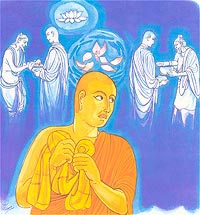Freedom of speech does not mean law of the land can be violated, says complainant
29912 Saturday LESSON 712 FREE ONLINE eNālāndā Research and Practice UNIVERSITY through http://sarvajan.ambedkar.org-
Dhammapada Verse 367 Pancaggadayaka Brahmana
Vatthu-He Is A Monk Who Has No Attachment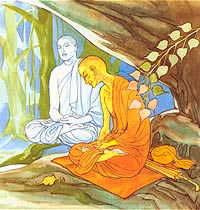
Verse 367. He Is A Monk Who Has No Attachment
For whom there is no making ‘mine’
towards all name and form,
who does not grieve for what is not,
he’s truly ‘bhikkhu’ called.
Explanation: He has gone beyond all sense of his own name
and form. To him, there is no existence of I, my or mine. If his name
and form entity were to decay and deteriorate, he will not grieve.
Such a person is called a monk.
Dhammapada Verse 367
Pancaggadayaka Brahmana
VatthuSabbaso namarupasmim
yassa natthi mamayitam
asata ca na socati
sa ve “bhikkhu” ti vuccati.Verse 367: He who does not take the
mind-and-body aggregate (nama-rupa) as “I and mine”, and who does not
grieve over the dissolution (of mind and body) is, indeed, called a bhikkhu.
The Story of the Giver of the First-Fruits of His Labour
While residing at the Jetavana
monastery, the Buddha uttered Verse (367) of this book, with reference to a
brahmin who was in the habit of making five offerings of first-fruits in
charity. The first-fruits here refer to the first-fruits of the field. The
first-fruits of the field are given in charity at the time of harvesting, at the
time of threshing, at the time of storing, at the time of cooking and at the
time of filling the plate.One day, the Buddha saw the
brahmin and his wife in his vision and knew that time was ripe for the couple to
attain Anagami Fruition. Accordingly, the Buddha set out for their house and
stood at the door for alms food. The brahmin who was then having his meal,
facing the interior part of the house, did not see the Buddha. His wife who was
near him saw the Buddha, but she was afraid that if her husband saw the Buddha
standing at the door for alms-food, he would offer all his rice in the plate
and, in that case, she would have to cook again. With this thought in her mind,
she stood behind her husband so that he would not see the Buddha; when she
quietly stepped backwards and slowly came to where the Buddha was standing, and
whispered to him, “Venerable Sir! We do not have any alms-food for you
today.” But the Buddha had decided not to leave the house; he just
shook his head. Seeing this gesture, the brahmin’s wife could not control
herself and she burst out laughing.At that instant, the brahmin
turned round and saw the Buddha. At once he knew what his wife had done, and he
cried out, “O you, my wretched wife! You have ruined me.” Then, taking
up his plate of rice, he approached the Buddha and apologetically requested,
“Venerable Sir! Please accept this rice which I have partly consumed.”
To him the Buddha replied, “O brahmin! Any rice is suitable for me,
whether it is not yet consumed, or is partly consumed, or even if it is the last
remaining spoonful.” The brahmin was very much surprised by the
Buddha’s reply; at the same time, it made him happy because his offer of rice
was accepted by the Buddha. The brahmin next asked the Buddha by what standard a
bhikkhu was judged and how a bhikkhu was defined. The Buddha knew that both the
brahmin and his wife had already learned something about mind and body (nama-rupa);
so he answered, “O brahmin! One who is not attached to mind and body is
called a bhikkhu.”Then the Buddha spoke in verse as
follows:
Verse 367: He who does
not take the mind-and-body aggregate (nama-rupa) as “I and
mine”, and who does not grieve over the dissolution (of mind and
body) is, indeed, called a bhikkhu.At the end of the discourse both
the brahmin and his wife attained Anagami Fruition.Please visit:
http://www.innovativefilmcity.in/home.html
HANDICRAFT & CULTURAL VILLAGE
HANDICRAFT & CULTURAL VILLAGE is an ethnic market place which
will house souvenir and handicraft shops. It will provide vivid flavors
of Karnataka & other states of India. Let it be the Yakshagana
performance of Karnataka or the famous Chennapatna toy collection or the
Ragi muddas, this village place will offer an elaborate experience of
the rich culture, craftsmanship & food tastes of various States of
India, to national & international tourists
This Ethnic Village will provide an opportunity to the village crafts
and culture to be displayed, demonstrated and sold. Modern generation
will find a platform to get introduced to our Indian heritage and ethnic
tastes of food, costumes, handicrafts, music, etc
Being a unique and a distinguished concept it will create a new landmark
in Karnataka, which will be a pride for our State. This will be a
Tourism Wonder & an added tourist attraction in Karnataka.
Along with local & national tourists, handicraft market will be a
major attraction for foreign tourists who visit India to explore its
deep rooted cultural heritage and craftsmanship.
Events
Activities will commence from 30th September 2012 & continue
till 2nd January 2013.
11 States of India are invited to participate
Handicraft shops of the participating States will be set up during the
entire period of three months
Artisans from these States will get an opportunity to give live demo of
their craftsmanship to the visitors
Food shops selling food cuisines of each state will be set up
Specific State festivals will be celebrated during which Cultural
performances of the celebrated State will be organized throughout the
day culminating into special cultural event in the evening at the
amphitheatre.

26 to 28912 Wednesday to Friday LESSON 711 FREE ONLINE eNālāndā Research and Practice UNIVERSITY through http://sarvajan.ambedkar.org Dhammapada Verse 363 Kokalika Vatthu The Ideal Monk Dhammapada Verse 364 Dhammaramatthera Vatthu Verse 364. The Monk Abides in Dhamma-Dhammapada Verses 365 and 366-Vipakkhasevaka Bhikkhu Vatthu-Verse 365. Accept What One Receives-Verse 366. The Gods Adore Virtuous Monks-The 13th Sakyadhita International Conference on Buddhist Women will be held in Vaishali (Bihar) India, January 5-12, 2013.thru -http://www.sakyadhita.org/
http://www.sakyadhita.org/
The 13th Sakyadhita International Conference on Buddhist Women will be held in Vaishali (Bihar) India, January 5-12, 2013.
Registration is NOW OPEN!
Registration extended to October 1
Visit the Conference & Tours Details page.
Before registering, view this video on how to register with the Online Form:
How to Register Sakyadhita13–Pay by Check or Wire Transfer
Download Tour Package Details, REVISED with
Flight and Train schedules and weather for Patna/Vaishali.
Download a printable (PDF) registration form to mail.
Download the 13th Sakyadhita Conference brochure.
Download a partial set of Presentation Abstracts.
NEW: Information on SAARC Registrations
NEW: Conference Program
Universal Welfare Friend-E-Good News
No.668, 5A Main Road
8th Cross, HAL III Stage, Bangalore-560075
India
A Conference Workshop:
The Mandala Dance of the 21 Praises of Tara

Lead by Prema Dasara. The Mandala Dance of the 21 Praises of Tara is
based on a simple sadhana (practice). The dance has been taught all over
the world, including to two groups of Tibetan nuns. During the 13th
Sakyadhita conference, Prema Dasara and some of her senior students will
teach the dance and then participants will offer the dance to the
community at the end of the conference. Learn more about the Tara Dance
and get previews of conference presentations on the Events Page.
Vaishali
Located near Patna, the capital of the Indian state of Bihar,
Vaishali possesses an incredibly rich past in the history of Buddhism.
Vaishali is one of The Eight Great Places that were either identified
specifically by the Buddha (Lumbini, Bodh Gaya, Sarnath, Kusinara) or
are places where a certain miraculous event is reported to have
occurred. Sravasti was the Place of the Twin Miracle, and also the place
where the Buddha spent the largest amount of time, being a major city
in ancient India. Rajgir, another major city in India, was the Place of
the subduing of Nalagiri, the angry elephant, through friendliness.
Sankasia was the Place of the descending to earth from Tusita heaven
(after a stay of 3 months teaching his mother the Abhidhamma). And
Vaishali was the Place of receiving an offering of honey from a monkey.
Vaishali was the capital of the Vajjian Republic of ancient India.
For Buddhist women, Vaishali is twice notable. First Lord Buddha
ordained the first woman, his stepmother and aunt, Mahaprajapati, at
Vaishali. Second he delivered his last sermon at Vaishali and announced
his Parinirvana there. Vaishali was also the venue for the second
Buddhist Council a hundred years after his demise.
There is additional information about Vaishali and its Buddhist history on the Wikipedia page.
Notable Buddhist sites in Vaiśālī

Reaching Bihar
Patna, the capital city of Bihar, is linked by Indian Airlines with
important cities like Kolkata, Delhi, Lucknow and Ranchi. Air Deccan
and Sahara Air also connect Patna with various cities in India.
Regular bus services connect the city of Patna with Ranchi and Siliguri.
There is also inter-state bus service available for commuting within
the state. The bus stand is located at Mithapur. The various means of
local transport include cars, auto rickshaw and rickshaws.
Train services connect Patna with locations like Kolkata, Delhi, Ranchi
and Varanasi as well as other important Indian cities and towns.
Download a map of India
Return to this page in the coming months for updates and Conference details.
JC Mitra
Upasaka
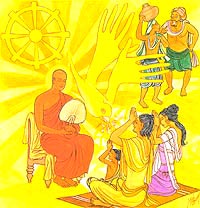
Verse 363. The Ideal Monk
Whatever bhikkhu tongue-controlled
speaks wisely and who is not proud,
who theory and practice can expound,
sweet as honey is his speech.
Explanation: The monk who controls his speech, who speaks
wisely with his mind composed, who explains the meaning of the Dhamma
- sweet are the words of that monk.
Dhammapada Verse 363
Kokalika Vatthu
Yo mukhasamyato bhikkhu
mantabhani anuddhato
attham dhammanca dipeti
madhuram tassa bhasitam.
Verse 363: The bhikkhu who controls his mouth
(speech) who speaks wisely with his mind composed, who explains the meaning and
the text of the Dhamma, — sweet are the words of that bhikkhu.
The Story of Bhikkhu Kokalika
While residing at the Jetavana
monastery, the Buddha uttered Verse (363) of this book, with reference to
Bhikkhu Kokalika.
Bhikkhu Kokalika had abused the
two Chief Disciples, the Venerable Sariputta and the Venerable Maha Moggallana.
For this evil deed Kokalika was swallowed up by the earth and had to suffer in Paduma
Niraya. Learning about his fate, the bhikkhus remarked that Kokalika had to
suffer grievously because he did not control his tongue. To those bhikkhus, the
Buddha said, “Bhikkhus! A bhikkhu must have control over his tongue; his
conduct must be good; his mind must be calm, subdued and not flitting about as
it pleases.”
Then the Buddha spoke in verse as
follows:
Verse 363: The bhikkhu
who controls his mouth (speech) who speaks wisely with his mind
composed, who explains the meaning and the text of the Dhamma, —
sweet are the words of that bhikkhu.
Verse 364. The Monk Abides in Dhamma
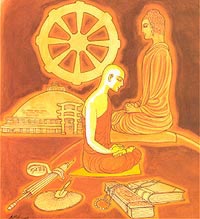
Verse 364. The Monk Abides in Dhamma
The bhikkhu who in Dhamma dwells,
in Dhamma delighting and pondering,
remembering the Dhamma - he
does not decline from Dhamma True.
Explanation: The monk who abides in the Dhamma, who delights
in the Dhamma, and is ever mindful of the Dhamma, does not fall away
from the Dhamma of the virtuous.
Dhammapada Verse 364
Dhammaramatthera VatthuDhammaramo dhammarato
dhammam anuvicintayam
dhammam anussaram bhikkhu
saddhamma1 na parihayati.Verse 364: The bhikkhu who abides in the
Dhamma, who delights in the Dhamma, who meditates on the Dhamma, and is ever
mindful of the Dhamma, does not fall away from the Dhamma of the virtuous1.
1. saddhamma: the Dhamma of the virtuous; i.e.,
the thirty-seven Factors of Enlightenment (Bodhipakkhiya Dhamma) and the nine
Transcendentals (Lokuttara Dhamma).
The Story of Thera Dhammarama
While residing at the Jetavana
monastery, the Buddha uttered Verse (364) of this book, with reference to Thera
Dhammarama.When it was made known to the
disciples that the Buddha would realize Parinibbana in four months’ time, most
of the puthujjana bhikkhus (i.e., those who had not attained any of the Maggas)
felt extremely depressed and were at a loss and did not know what to do. They
just stayed close to the Buddha, hardly ever leaving his presence. However,
there was a bhikkhu by the name of Dhammarama who kept to himself and did not go
near the Buddha. His intention was to strive most ardently to attain arahatship
before the passing away of the Buddha. So he strove hard in Insight Meditation
Practice. Other bhikkhus, not understanding his attitude and his noble ambition,
misunderstood his behaviour.Those bhikkhus took Dhammarama to
the Buddha and said to the Enlightened One, “Venerable Sir! This bhikkhu
does not seem to have any affection or regard or reverence for you; he has been
staying by himself while all the time other bhikkhus are staying close to Your
Venerable presence.” When other bhikkhus had said everything they wanted to
say, Dhammarama respectfully explained to the Buddha why he had not come to see
the Buddha and also reported that he had been striving his utmost in Insight
Meditation Practice.The Buddha was satisfied and was
very pleased with the explanation and conduct of Dhammarama and he said, “My
son, Dhammarama, you have done very well. A bhikkhu who loves and respects me
should act like you. Those who made offerings of flowers, scents and incense to
me are not really paying me homage. Only those who practise the Dhamma are the
ones who truly pay homage to me.”Then the Buddha spoke in verse as
follows:
Verse 364: The bhikkhu
who abides in the Dhamma, who delights in the Dhamma, who meditates on
the Dhamma, and is ever mindful of the Dhamma, does not fall away from
the Dhamma of the virtuous.At the end of the discourse Thera Dhammarama attained arahatship.
Verse 365. Accept What One Receives
He should not disdain his gains
nor live of others envious,
the bhikkhu who is envious
does not attain collectedness.Explanation: Do not underestimate what you have received.
And again, do not expect what others have got. If a monk covets what
others have received, he will never attain tranquillity of mind.
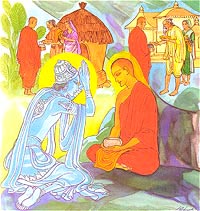
Verse 366. The Gods Adore Virtuous Monks
Disdaining not his gains,
though little he receives,
pure of life and keen
that bhikkhu devas praise.Explanation: The monk may have received only a little but
he does not under estimate what was given him. He is satisfied with
what he has received. Such a monk, who leads a pure livelihood, is
praised by deities.
Dhammapada Verses 365 and 366
Vipakkhasevaka Bhikkhu
Vatthu
Salabham natimanneyya
na’ nnesam pihayam care
annesam pihayam bhikkhu
samadhim nadhigacchati.
Appalabhopi ce bhikkhu
salabham nati mannati
tam ve deva pasamasanti
suddhajivim atanditam.
Verse 365: One should not despise what one has
received (by proper means), nor should one envy others their gains. The bhikkhu
who envies others cannot attain Concentration (Samadhi).
Verse 366: Though he receives only a little,
if a bhikkhu does not despise what he has received (by proper means), the devas
will surely praise him who leads a pure life and is not slothful.
The Story of a Bhikkhu Who Associated With a Follower of
Devadatta
While residing at the Jetavana
monastery, the Buddha uttered Verses (365) and (366) of this book, with
reference to a bhikkhu who was on friendly terms with a follower of Devadatta.
Once, a bhikkhu disciple of the
Buddha, being very friendly with a follower of Devadatta, paid a visit to the
monastery of Devadatta and stayed there for a few days. Other bhikkhus reported
to the Buddha that he had been mixing with the followers of Devadatta and that
he had even gone to the monastery of Devadatta, spent there a few days, eating,
sleeping and apparently enjoying the choice food and the comforts of that
monastery. The Buddha sent for that bhikkhu and asked him whether what he had
heard about his behaviour was true. The bhikkhu admitted that he had gone to the
monastery of Devadatta for a few days, but he told the Buddha that he had not
embraced the teaching of Devadatta.
The Buddha then reprimanded him
and pointed out that his behaviour made him appear like a follower of Devadatta.
To him the Buddha said, “My son, even though you have not embraced the
doctrine of Devadatta, you are going about as if you were one of his followers.
A bhikkhu should be contented with what he gets and should not covet other
people’s gains. A bhikkhu who is filled with envy at the good fortune of others
will not attain concentration (samadhi), or Insight, or the Path that leads to
Nibbana (Magga). Only the bhikkhu who is contented with whatever he gets will be
able to attain concentration, Insight and the Path.”
Then the Buddha spoke in verse as
follows:
| Verse 365: One should not despise what one has received (by proper means), nor should one envy others their gains. The bhikkhu who envies others cannot attain Concentration (Samadhi). |
| Verse 366: Though he receives only a little, if a bhikkhu does not despise what he has received (by proper means), the devas will surely praise him who leads a pure life and is not slothful. |
26912 Wednesday and 27912 Thursday LESSON 711 FREE ONLINE eNālāndā Research and Practice UNIVERSITY through http://sarvajan.ambedkar.org Dhammapada Verse 363 Kokalika Vatthu The Ideal Monk Dhammapada Verse 364 Dhammaramatthera Vatthu Verse 364. The Monk Abides in Dhamma
Verse 363. The Ideal Monk
Whatever bhikkhu tongue-controlled
speaks wisely and who is not proud,
who theory and practice can expound,
sweet as honey is his speech.
Explanation: The monk who controls his speech, who speaks
wisely with his mind composed, who explains the meaning of the Dhamma
- sweet are the words of that monk.
Dhammapada Verse 363
Kokalika Vatthu
Yo mukhasamyato bhikkhu
mantabhani anuddhato
attham dhammanca dipeti
madhuram tassa bhasitam.
Verse 363: The bhikkhu who controls his mouth
(speech) who speaks wisely with his mind composed, who explains the meaning and
the text of the Dhamma, — sweet are the words of that bhikkhu.
The Story of Bhikkhu Kokalika
While residing at the Jetavana
monastery, the Buddha uttered Verse (363) of this book, with reference to
Bhikkhu Kokalika.
Bhikkhu Kokalika had abused the
two Chief Disciples, the Venerable Sariputta and the Venerable Maha Moggallana.
For this evil deed Kokalika was swallowed up by the earth and had to suffer in Paduma
Niraya. Learning about his fate, the bhikkhus remarked that Kokalika had to
suffer grievously because he did not control his tongue. To those bhikkhus, the
Buddha said, “Bhikkhus! A bhikkhu must have control over his tongue; his
conduct must be good; his mind must be calm, subdued and not flitting about as
it pleases.”
Then the Buddha spoke in verse as
follows:
Verse 363: The bhikkhu
who controls his mouth (speech) who speaks wisely with his mind
composed, who explains the meaning and the text of the Dhamma, —
sweet are the words of that bhikkhu.
Verse 364. The Monk Abides in Dhamma

Verse 364. The Monk Abides in Dhamma
The bhikkhu who in Dhamma dwells,
in Dhamma delighting and pondering,
remembering the Dhamma - he
does not decline from Dhamma True.
Explanation: The monk who abides in the Dhamma, who delights
in the Dhamma, and is ever mindful of the Dhamma, does not fall away
from the Dhamma of the virtuous.
Dhammapada Verse 364
Dhammaramatthera VatthuDhammaramo dhammarato
dhammam anuvicintayam
dhammam anussaram bhikkhu
saddhamma1 na parihayati.Verse 364: The bhikkhu who abides in the
Dhamma, who delights in the Dhamma, who meditates on the Dhamma, and is ever
mindful of the Dhamma, does not fall away from the Dhamma of the virtuous1.
1. saddhamma: the Dhamma of the virtuous; i.e.,
the thirty-seven Factors of Enlightenment (Bodhipakkhiya Dhamma) and the nine
Transcendentals (Lokuttara Dhamma).
The Story of Thera Dhammarama
While residing at the Jetavana
monastery, the Buddha uttered Verse (364) of this book, with reference to Thera
Dhammarama.When it was made known to the
disciples that the Buddha would realize Parinibbana in four months’ time, most
of the puthujjana bhikkhus (i.e., those who had not attained any of the Maggas)
felt extremely depressed and were at a loss and did not know what to do. They
just stayed close to the Buddha, hardly ever leaving his presence. However,
there was a bhikkhu by the name of Dhammarama who kept to himself and did not go
near the Buddha. His intention was to strive most ardently to attain arahatship
before the passing away of the Buddha. So he strove hard in Insight Meditation
Practice. Other bhikkhus, not understanding his attitude and his noble ambition,
misunderstood his behaviour.Those bhikkhus took Dhammarama to
the Buddha and said to the Enlightened One, “Venerable Sir! This bhikkhu
does not seem to have any affection or regard or reverence for you; he has been
staying by himself while all the time other bhikkhus are staying close to Your
Venerable presence.” When other bhikkhus had said everything they wanted to
say, Dhammarama respectfully explained to the Buddha why he had not come to see
the Buddha and also reported that he had been striving his utmost in Insight
Meditation Practice.The Buddha was satisfied and was
very pleased with the explanation and conduct of Dhammarama and he said, “My
son, Dhammarama, you have done very well. A bhikkhu who loves and respects me
should act like you. Those who made offerings of flowers, scents and incense to
me are not really paying me homage. Only those who practise the Dhamma are the
ones who truly pay homage to me.”Then the Buddha spoke in verse as
follows:
Verse 364: The bhikkhu
who abides in the Dhamma, who delights in the Dhamma, who meditates on
the Dhamma, and is ever mindful of the Dhamma, does not fall away from
the Dhamma of the virtuous.At the end of the discourse Thera Dhammarama attained arahatship.
http://www.sakyadhita.org/
The 13th Sakyadhita International Conference on Buddhist Women will be held in Vaishali (Bihar) India, January 5-12, 2013.
Registration is NOW OPEN!
Registration extended to October 1
Visit the Conference & Tours Details page.
Before registering, view this video on how to register with the Online Form:
How to Register Sakyadhita13–Pay by Check or Wire TransferDownload Tour Package Details, REVISED with
Flight and Train schedules and weather for Patna/Vaishali.Download a printable (PDF) registration form to mail.
Download the 13th Sakyadhita Conference brochure.
Download a partial set of Presentation Abstracts.NEW: Information on SAARC Registrations
NEW: Conference Program
Universal Welfare Friend-E-Good News
No.668, 5A Main Road
8th Cross, HAL III Stage, Bangalore-560075
IndiaA Conference Workshop:
The Mandala Dance of the 21 Praises of Tara
Lead by Prema Dasara. The Mandala Dance of the 21 Praises of Tara is
based on a simple sadhana (practice). The dance has been taught all over
the world, including to two groups of Tibetan nuns. During the 13th
Sakyadhita conference, Prema Dasara and some of her senior students will
teach the dance and then participants will offer the dance to the
community at the end of the conference. Learn more about the Tara Dance
and get previews of conference presentations on the Events Page.Vaishali
Located near Patna, the capital of the Indian state of Bihar,
Vaishali possesses an incredibly rich past in the history of Buddhism.
Vaishali is one of The Eight Great Places that were either identified
specifically by the Buddha (Lumbini, Bodh Gaya, Sarnath, Kusinara) or
are places where a certain miraculous event is reported to have
occurred. Sravasti was the Place of the Twin Miracle, and also the place
where the Buddha spent the largest amount of time, being a major city
in ancient India. Rajgir, another major city in India, was the Place of
the subduing of Nalagiri, the angry elephant, through friendliness.
Sankasia was the Place of the descending to earth from Tusita heaven
(after a stay of 3 months teaching his mother the Abhidhamma). And
Vaishali was the Place of receiving an offering of honey from a monkey.
Vaishali was the capital of the Vajjian Republic of ancient India.For Buddhist women, Vaishali is twice notable. First Lord Buddha
ordained the first woman, his stepmother and aunt, Mahaprajapati, at
Vaishali. Second he delivered his last sermon at Vaishali and announced
his Parinirvana there. Vaishali was also the venue for the second
Buddhist Council a hundred years after his demise.There is additional information about Vaishali and its Buddhist history on the Wikipedia page.
Notable Buddhist sites in Vaiśālī
Reaching Bihar
Patna, the capital city of Bihar, is linked by Indian Airlines with
important cities like Kolkata, Delhi, Lucknow and Ranchi. Air Deccan
and Sahara Air also connect Patna with various cities in India.Regular bus services connect the city of Patna with Ranchi and Siliguri.
There is also inter-state bus service available for commuting within
the state. The bus stand is located at Mithapur. The various means of
local transport include cars, auto rickshaw and rickshaws.Train services connect Patna with locations like Kolkata, Delhi, Ranchi
and Varanasi as well as other important Indian cities and towns.Download a map of India
Return to this page in the coming months for updates and Conference details.
JC Mitra
Upasaka
26912 Wednesday LESSON 710 FREE ONLINE eNālāndā Research and Practice UNIVERSITY through http://sarvajan.ambedkar.org Dhammapada Verse 363 Kokalika Vatthu The Ideal Monk
Verse 363. The Ideal Monk
Whatever bhikkhu tongue-controlled
speaks wisely and who is not proud,
who theory and practice can expound,
sweet as honey is his speech.
Explanation: The monk who controls his speech, who speaks
wisely with his mind composed, who explains the meaning of the Dhamma
- sweet are the words of that monk.
Dhammapada Verse 363
Kokalika Vatthu
Yo mukhasamyato bhikkhu
mantabhani anuddhato
attham dhammanca dipeti
madhuram tassa bhasitam.
Verse 363: The bhikkhu who controls his mouth
(speech) who speaks wisely with his mind composed, who explains the meaning and
the text of the Dhamma, — sweet are the words of that bhikkhu.
The Story of Bhikkhu Kokalika
While residing at the Jetavana
monastery, the Buddha uttered Verse (363) of this book, with reference to
Bhikkhu Kokalika.
Bhikkhu Kokalika had abused the
two Chief Disciples, the Venerable Sariputta and the Venerable Maha Moggallana.
For this evil deed Kokalika was swallowed up by the earth and had to suffer in Paduma
Niraya. Learning about his fate, the bhikkhus remarked that Kokalika had to
suffer grievously because he did not control his tongue. To those bhikkhus, the
Buddha said, “Bhikkhus! A bhikkhu must have control over his tongue; his
conduct must be good; his mind must be calm, subdued and not flitting about as
it pleases.”
Then the Buddha spoke in verse as
follows:
| Verse 363: The bhikkhu who controls his mouth (speech) who speaks wisely with his mind composed, who explains the meaning and the text of the Dhamma, — sweet are the words of that bhikkhu. |
25912 Tuesday LESSON 709 FREE ONLINE eNālāndā Research and Practice UNIVERSITY through http://sarvajan.ambedkar.org Dhammapada Verse 362 Hamsaghatakabhikkhu Vatthu-The True Monk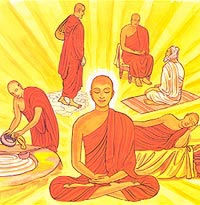
Verse 362. The True Monk
With hands controlled and feet controlled,
in speech as well as head controlled,
delighting in inward collectedness
alone, content, a bhikkhu’s called.
Explanation: He who controls his hands, controls his foot,
controls his speech, and has complete control of himself; who finds
delight in insight development practice and is calm; who stays alone
and is contented they call him a monk.
Dhammapada Verse 362
Hamsaghatakabhikkhu Vatthu
Hatthasamyato padasamyato
vacasamyato samyatuttamo
ajjhattarato samahito
eko santusito tamahu bhikkhum.
Verse 362: He who controls his hand, controls
his foot, controls his speech, and has complete control of himself; who finds
delight in Insight Development Practice and is calm; who stays alone and is
contented; — him they call a bhikkhu.
The Story of a Bhikkhu Who Killed a Swan (Hamsa)
While residing at the Jetavana
monastery, the Buddha uttered Verse (362) of this book, with reference to a
bhikkhu who killed a swan.
Once there was a bhikkhu who was
very skilful in throwing stones; he could even hit fast-moving objects without
fail. One day, while sitting with another bhikkhu after having their bath in the
Aciravati River, he saw two swans flying at some distance. He told his friend
that he would get one of the swans by throwing a stone at it. At that instant,
the swan, hearing voices, turned its neck and the bhikkhu threw a pebble at the
bird. The pebble went through one eye and came out of the other eye of the bird.
The bird cried out in pain and agony and dropped dead at the feet of the young
bhikkhu.
Other bhikkhus seeing the
incident took the young bhikkhu to the Buddha. The Buddha reprimanded him and
said, “My son, why have you killed this bird? Why especially you, a
member of my Order, who should be practising loving-kindness to all beings and
who should be striving ardently for liberation from the round of rebirths? Even
during the period outside the Teaching, the wise practised morality and observed
the precepts. A bhikkhu must have control over his hands, his feet and his
tongue.”
Then the Buddha spoke in verse as
follows:
| Verse 362: He who controls his hand, controls his foot, controls his speech, and has complete control of himself; who finds delight in Insight Development Practice and is calm; who stays alone and is contented; — him they call a bhikkhu. |
23912and 24912 Sunday and Monday LESSON 708 FREE ONLINE eNālāndā Research and Practice UNIVERSITY through http://sarvajan.ambedkar.org Dhammapada Verses 356, 357, 358 and 359 Ankura Vatthu-Verse
356. Those Without The Bane Of Passion-Verse 357. Those Without The
Bane Of Ill-Will-Verse 358. Those Without The Bane Of Illusion-Verse
359. Those Without The Bane Of Greed-Dhammapada Verses 360 and 361 Pancabhikkhu Vatthu-Verse 360. Sense Discipline-Verse 361. Suffering End With All-Round Discipline
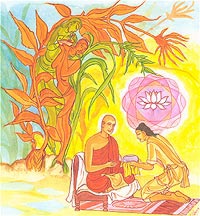 |
Verse 356. Those Without The Bane Of Passion
Explanation: Fields have grasses as their bane. The ordinary |
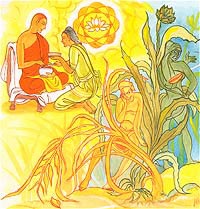 |
Verse 357. Those Without The Bane Of Ill-Will
Explanation: Fields have weeds as their bane. The ordinary |
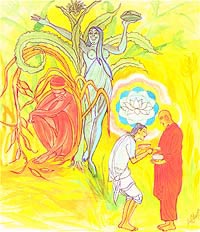 |
Verse 358. Those Without The Bane Of Illusion
Explanation: Fields have weeds as their bane. |
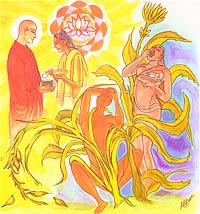 |
Verse 359. Those Without The Bane Of Greed
Explanation: Fields have weeds as their bane. |
Dhammapada Verses 356, 357, 358 and 359
Ankura VatthuTinadosani khettani
ragadosa ayam paja
tasma hi vitaragesu
dinnam hoti mahapphalam.Tinadosani khettani
dosadosa ayam paja
tasma hi vitadosesu
dinnam hoti mahapphalam.Tinadosani khettani
mohadosa ayam paja
tasma hi vitamohesu
dinnam hoti mahapphalam.Tinadosani khettani
icchadosa ayam paja
tasma hi vigaticchesu
dinnam hoti mahapphalam.Verse 356: Weeds damage fields; lust spoils all beings. Therefore, giving to
those free from lust yields great benefit.Verse 357: Weeds damage fields; ill will spoils all beings. Therefore, giving
to those free from ill will yields great benefit.Verse 358: Weeds damage fields; ignorance spoils all beings. Therefore,
giving to those free from ignorance yields great benefit.Verse 359: Weeds damage fields; covetousness spoils all beings. Therefore,
giving to those free from covetousness yields great benefit.
The Story of Deva Ankura
While on a visit to the Tavatimsa deva realm, the Buddha uttered Verses (356)
to (359) of this book, with reference to a deva named Ankura.The Buddha visited the Tavatimsa deva realm to expound the Abhidhamma to Deva
Santusita, who had been his mother. During that time, there was a deva named
Indaka in Tavatimsa. Indaka, in his last existence as a man, had offered a
little alms-food to Thera Anuruddha. As this good deed was made to a thera
within the period of the Buddha’s Teaching he was amply rewarded for it. Thus,
on his death he was reborn in the Tavatimsa realm and was lavishly bestowed with
the luxuries of the deva world. At that time, there was also another deva by the
name of Ankura in Tavatimsa who had given much in charity; in fact, many times
more than what Indaka had given. But his charity was made outside the period of
the Teaching of any of the Buddhas. So, in spite of his lavish and grand
charities, he was enjoying the benefits of the life of a deva on a much smaller
scale than Indaka, who had offered very little. As the Buddha was then at
Tavatimsa, Ankura asked him the reason for the discrepancy in gaining the
benefits. To him the Buddha answered, “O deva! When giving charities
and donations you should choose whom you give, for acts of charities are just
like seeds. Seeds put into fertile soil will grow into strong, vigorous plants
or trees and will bear much fruit; but you had sown your seed in poor soil, so
you reap poorly.”Then the Buddha spoke in verse as follows:
Verse 356: Weeds damage fields; lust spoils all
beings. Therefore, giving to those free from lust yields great
benefit.Verse 357: Weeds damage fields; ill will spoils
all beings. Therefore, giving to those free from ill will yields great
benefit.Verse 358: Weeds damage fields; ignorance spoils
all beings. Therefore, giving to those free from ignorance yields
great benefit.Verse 359: Weeds damage fields; covetousness
spoils all beings. Therefore, giving to those free from covetousness
yields great benefit.
End of Chapter Twenty-four: Craving
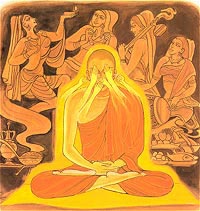 |
Verse 360. Sense Discipline
Explanation: It is good to be disciplined in the eye. It is |
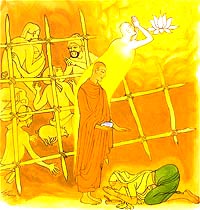 |
Verse 361. Suffering End With All-Round Discipline
Explanation: It is good to be disciplined in body. It is good |
Dhammapada Verses 360 and 361
Pancabhikkhu Vatthu
Cakkhuna samvaro sadhu
sadhu sotena samvaro
ghanena samvaro sadhu
sadhu jivhaya sarmvaro.
Kayena samvaro sadhu
sadhu vacaya samvaro
manasa samvaro sadhu
sadhu sabbattha samvaro
sabattha sambuto bhikkhu
sabbadukkha pamuccati.
Verse 360: Restraint
in the eye is good, good is restraint in the ear; restraint in the nose is good,
good is restraint in the tongue.
Verse 361: Restraint in body is good, good is
restraint in speech; restraint in mind is good, good is restraint in all the
senses. A bhikkhu restrained in all the senses is freed from all ills (Samsara
dukkha).
The Story of Five Bhikkhus
While residing at the Jetavana
monastery, the Buddha uttered Verses (360) and (361) of this book, with
reference to five bhikkhus.
Once there were five bhikkhus in
Savatthi. Each of them practised restraint of just one out of the five senses
and each of them claimed that what he was practising was the most difficult.
There were some heated arguments over this and they could not come to an
agreement. Finally, they went to the Buddha to ask for his decision. The Buddha
said to them, “Each of the senses is just as difficult to control as the
other; but all bhikkhus must control all the five senses and not just one. Only
those who control all the senses would escape from the round of rebirths.”
Then the Buddha spoke in verse as
follows:
|
Verse 360: Restraint |
|
Verse 361: Restraint |
Thus have I heard:
On one occasion the Blessed One was living near Savatthi at Jetavana
at Anathapindika’s monastery. Then in the forenoon the Blessed One
having dressed himself, took bowl and (double) robe, and entered the
city of Savatthi for alms. Now at that time a fire was burning, and an
offering was being prepared in the house of the brahman
Aggikabharadvaja. Then the Blessed One, while on his alms round, came to
the brahman’s residence. The brahman seeing the Blessed One some way
off, said this: “Stay there, you shaveling, stay there you wretched
monk, stay there you outcast.” When he spoke thus the Blessed One said
to the brahman: “Do you know, brahman, who an outcast is and what the
conditions are that make an outcast?” “No, indeed, Venerable Gotama, I
do not know who an outcast is nor the conditions that make an outcast.
It is good if Venerable Gotama were to explain the Dhamma to me so that I
may know who an outcast is and what the conditions are that make an
outcast.”[1]
“Listen then, brahman, and pay attention, I will speak.”
“Yes, Venerable Sir,” replied the brahman.
1. “Whosoever is angry, harbors hatred, and is reluctant to speak
well of others (discredits the good of others), perverted in views,
deceitful — know him as an outcast.
2. “Whosoever in this world kills living beings, once born or twice born,[2] in whom there is no sympathy for living beings — know him as an outcast.
3. “Whosoever destroys and besieges villages and hamlets and becomes notorious as an oppressor — know him as an outcast.
4. “Be it in the village, or in the forest, whosoever steals what
belongs to others, what is not given to him — know him as an outcast.
5. “Whosoever having actually incurred a debt runs away when he is
pressed to pay, saying, ‘I owe no debt to you’ — know him as an outcast.
6. “Whosoever coveting anything, kills a person going along the road,
and grabs whatever that person has — know him as an outcast.
7. “He who for his own sake or for the sake of others or for the sake
of wealth, utters lies when questioned as a witness — know him as an
outcast.
8. “Whosoever by force or with consent associates with the wives of relatives or friends — know him as an outcast.
9. “Whosoever being wealthy supports not his mother and father who have grown old — know him as an outcast.
10. “Whosoever strikes and annoys by (harsh) speech, mother, father,
brother, sister or mother-in-law or father-in-law — know him as an
outcast.
11. “Whosoever when questioned about what is good, says what is
detrimental, and talks in an evasive manner- know him as an outcast.
12. “Whosoever having committed an evil deed, wishes that it may not
be known to others, and commits evil in secret — know him as an outcast.
13. “Whosoever having gone to another’s house, and partaken of choice
food, does not honor that host by offering food when he repays the
visit — know him as an outcast.
14. “Whosoever deceives by uttering lies, a brahman or an ascetic, or any other mendicant — know him as an outcast.
15. “Whosoever when a brahman or ascetic appears during mealtime
angers him by harsh speech, and does not offer him (any alms) — know him
as an outcast.
16. “Whosoever in this world, shrouded in ignorance, speaks harsh words (asatam) or falsehood[3] expecting to gain something — know him as an outcast.
17. “Whosoever debased by his pride, exalts himself and belittles other — know him as an outcast.
18. “Whosoever is given to anger, is miserly, has base desires, and
is selfish, deceitful, shameless and fearless (in doing evil) — know him
as an outcast.
19. “Whosoever reviles the Enlightened One (the Buddha), or a
disciple of the Buddha, recluse or a householder — know him as an
outcast.
20. “Whosoever not being an arahant, a Consummate One, pretends to be
so, is a thief in the whole universe — he is the lowest of outcasts.
21. “Not by birth is one an outcast; not by birth is one a brahman.
By deed one becomes an outcast, by deed one becomes a brahman.
22. “Know ye by the example I now cite (the fact that by birth one is
not an outcast). There was an outcast’s son, Sopaka, who became known
as Matanga.
23. “This Matanga attained the highest fame so difficult to gain. Many were the warriors (kshatriyas) and brahmans who went to attend on him.
24. “Mounting the celestial chariot (the Noble Eightfold path, and
driving) along the passion-free high road, (Sopaka, now a monk), reached
the Brahma realm having given up sense desires.
25. “His (lowly) birth did not prevent him from being reborn in the
Brahma realm. There are brahmans born in the family of preceptors,
kinsmen of (veda) hymns.
26. “They are often seen committing evil deeds. In this life itself
they are despised, in the next they are born in an evil state of
existence. High birth does not prevent them from falling into a woeful
state, or from censure.
27. “Not by birth is one an outcast; not by birth is one a brahman.
By deed one becomes an outcast, by deed one becomes an brahman.”
When the Buddha had thus spoken, the Brahman Aggikabharadvaja said to
the Blessed One: “Excellent, O Venerable Gotama, excellent! Just as, O
Venerable Gotama, a man were to set upright what had been overturned, or
were to reveal what had been hidden, or were to point the way to one
who had gone astray, or were to hold an oil lamp in the dark so that
those with eyes may see things, even so in many ways has the Venerable
Gotama expounded the Dhamma, the doctrine. I take refuge in the
Venerable Gotama, the Dhamma, and the Sangha, the Order. May the
Venerable Gotama accept me as a lay follower who has taken refuge from
this day onwards while life lasts.”
Notes
- 1.
- The abusive terms used by the brahman and the respectful address
that follows need a word of explanation. The brahman had just prepared
his offering to the great Brahma, his God, when his eyes fell on Buddha.
To the brahman the sight of a samana, a shaven-headed recluse,
was an unlucky sign. Hence he burst into angry words. The Buddha,
however, was unruffled and spoke to him quietly in words of soft
cadence. The brahman apparently was ashamed, and repenting of his folly,
addressed the Buddha courteously. Comy. It is interesting to note the
Buddha’s stress on anger and hatred in his very first stanza. - 2.
- dvijam, birds. Twice-born is a reference to birds since they first come out as an egg, and when hatched a complete bird is born.
- 3.
- asantamtipi patho, SnA.
Babu Jagjivan Ram, a first class first in academics was far better than
Indira Gandhi. But he was denied PM’s post by the congress. Babuji said that” I
may be the Dy. Prime Minister of this country. But my cook and my chapprasi
feel that I am inferior to them by caste. Even the Janatha Party formed by Jan Sangh, today’s
BJP just made drama as though they wanted to Make Babuji as PM. But in reality
they let him down. Babuji was no way inferior to Vajpayee. They could have made
him as thge PM instead of shedding crocodile tears for SC/STs. Now the Cook Jathis (meaning birth, lump, mass, white,
black, rich, poor, middle class and so on), are shedding crocodile tears through some
created dummies for the sake of votes. These dummies cannot become real nor the
chelas(carry bags ) become the contents nor the Chamchaas (spoons) become the
eatables. They will just be puniyas and Sanje (evening swines) of the ruling
Jathis who will be comfortable in drainages thinking that they ARE HEAVENS.The
traditional venomous full of hatred and anger mad manush jathi that was
responsible for creation of the so
called different colours of first rate, 2nd,3rd,4th
rate jathis and 22.5% population without any soul, so that they could do any
harm they wished to do to them. Though some 15% of 2nd and 3rd
rate jathis accepted the 1st rate jathi as supreme. Rest of the
population are aware of this cunning tricks.Babuji said once “Don’t believe the
Parliamentary Committee for SC/STs or the National Commission for SC/ST. They
cannot do any good for SC/STs. Take large number of cases to the Courts for
reddressal of grievances to these communities. That was the confidence he had
on the Constitution. Now the 1st rate jathis are once again trying
to divide the society for votes. Followers of Dr.Ambedkar, Babuji, Kanshiramji
and Ms Mayawati will not believe such gimmicks, until these colourful
jathivadis become broad minded and elect Ms Mayawati as PM, like the Americans who elected Obama as the
President of US.. Next election will hand over the MASTERKEY to them as desired
by these leaders. The first rate jathi is aware of this and hence trying to
devide the people for their vested interest. If the CEC does justice in draping
all the hands of Congress, Lotus of BJP and other symblols of ruling parties
such as bicycle, lantern, rising Sun,
two leaves, and so on and all the statues of 1st,2nd,3rd
rate jathi leaders, as they did to the elephant symbol and SC/ST/OBC icons plus
the secure EVMs with their source codes made public, nobody can stop the
MASTERKEY to the deserving for the peace, welfare and happiness of the entire
people, including the VIEWS PAPERS and the MEDIAS with ulterior IDEAS including
the Jathivadi badtimes VIEWS Paper.
23912 Sunday LESSON 708 FREE ONLINE eNālāndā Research and Practice UNIVERSITY through http://sarvajan.ambedkar.org Dhammapada Verses 356, 357, 358 and 359 Ankura Vatthu-Verse 356. Those Without The Bane Of Passion-Verse 357. Those Without The Bane Of Ill-Will-Verse 358. Those Without The Bane Of Illusion-Verse 359. Those Without The Bane Of Greed
 |
Verse 356. Those Without The Bane Of Passion
Explanation: Fields have grasses as their bane. The ordinary |
 |
Verse 357. Those Without The Bane Of Ill-Will
Explanation: Fields have weeds as their bane. The ordinary |
 |
Verse 358. Those Without The Bane Of Illusion
Explanation: Fields have weeds as their bane. |
 |
Verse 359. Those Without The Bane Of Greed
Explanation: Fields have weeds as their bane. |
Dhammapada Verses 356, 357, 358 and 359
Ankura VatthuTinadosani khettani
ragadosa ayam paja
tasma hi vitaragesu
dinnam hoti mahapphalam.Tinadosani khettani
dosadosa ayam paja
tasma hi vitadosesu
dinnam hoti mahapphalam.Tinadosani khettani
mohadosa ayam paja
tasma hi vitamohesu
dinnam hoti mahapphalam.Tinadosani khettani
icchadosa ayam paja
tasma hi vigaticchesu
dinnam hoti mahapphalam.Verse 356: Weeds damage fields; lust spoils all beings. Therefore, giving to
those free from lust yields great benefit.Verse 357: Weeds damage fields; ill will spoils all beings. Therefore, giving
to those free from ill will yields great benefit.Verse 358: Weeds damage fields; ignorance spoils all beings. Therefore,
giving to those free from ignorance yields great benefit.Verse 359: Weeds damage fields; covetousness spoils all beings. Therefore,
giving to those free from covetousness yields great benefit.
The Story of Deva Ankura
While on a visit to the Tavatimsa deva realm, the Buddha uttered Verses (356)
to (359) of this book, with reference to a deva named Ankura.The Buddha visited the Tavatimsa deva realm to expound the Abhidhamma to Deva
Santusita, who had been his mother. During that time, there was a deva named
Indaka in Tavatimsa. Indaka, in his last existence as a man, had offered a
little alms-food to Thera Anuruddha. As this good deed was made to a thera
within the period of the Buddha’s Teaching he was amply rewarded for it. Thus,
on his death he was reborn in the Tavatimsa realm and was lavishly bestowed with
the luxuries of the deva world. At that time, there was also another deva by the
name of Ankura in Tavatimsa who had given much in charity; in fact, many times
more than what Indaka had given. But his charity was made outside the period of
the Teaching of any of the Buddhas. So, in spite of his lavish and grand
charities, he was enjoying the benefits of the life of a deva on a much smaller
scale than Indaka, who had offered very little. As the Buddha was then at
Tavatimsa, Ankura asked him the reason for the discrepancy in gaining the
benefits. To him the Buddha answered, “O deva! When giving charities
and donations you should choose whom you give, for acts of charities are just
like seeds. Seeds put into fertile soil will grow into strong, vigorous plants
or trees and will bear much fruit; but you had sown your seed in poor soil, so
you reap poorly.”Then the Buddha spoke in verse as follows:
Verse 356: Weeds damage fields; lust spoils all
beings. Therefore, giving to those free from lust yields great
benefit.Verse 357: Weeds damage fields; ill will spoils
all beings. Therefore, giving to those free from ill will yields great
benefit.Verse 358: Weeds damage fields; ignorance spoils
all beings. Therefore, giving to those free from ignorance yields
great benefit.Verse 359: Weeds damage fields; covetousness
spoils all beings. Therefore, giving to those free from covetousness
yields great benefit.
End of Chapter Twenty-four: Craving
21912 and 22912 Friday and Saturday LESSON 707 FREE ONLINE eNālāndā Research and Practice UNIVERSITY through http://sarvajan.ambedkar.org
Dhammapada Verse 354 Sakkapanha Vatthu-The Conquest Of All Suffering–Dhammapada Verse 355
Aputtakasetthi Vatthu-Verse 355. Wealth Destroys The Ignorant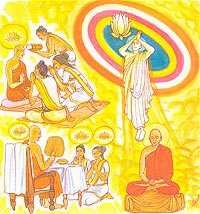
Verse 354. The Conquest Of All Suffering
Gift of Dhamma surpasses all gifts,
the Dhamma, its taste all other tastes beats,
delight in the Dhamma bests other delights,
destruction of craving conquers all ill.
Explanation: The gift of Dhamma excels all others gifts; the
taste of Dhamma excels all other tastes; delight in the Dhamma excels
all other delights. The eradication of craving overcomes all ills.
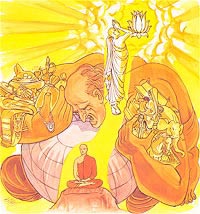
Dhammapada Verse 354
Sakkapanha VatthuSabbadanam dhammadanam jinati
sabbarasam dhammaraso jinati
sabbaratim dhammarati jinati
tanhakkhayo sabbadukkham jinati.Verse 354: The gift of the Dhamma excels all gifts; the taste of the Dhamma
excels all tastes; delight in the Dhamma excels all delights. The eradication of
Craving (i.e., attainment of arahatship) overcomes all ills (samsara dukkha).
The Story of the Questions Raised by Sakka
While residing at the Jetavana monastery, the Buddha uttered Verse (354) of
this book, with reference to four questions raised by Sakka, king of the devas.On one occasion, at a meeting of the devas in the Tavatimsa realm, four
questions were raised, but the devas failed to get the correct answers.
Eventually, Sakka took these devas to the Buddha at the Jetavana monastery.
After explaining their difficulty, Sakka presented the following four questions:(a) Among gifts, which is the best?
(b) Among tastes, which is the best?
(c) Among delights, which is the best?
(d) Why is the eradication of craving said to
be the most excellent?To these questions, the Buddha replied, “Oh Sakka, the Dhamma is the
noblest of all gifts, the best of all tastes and the best of all delights.
Eradication of Craving leads to the attainment of arahatship and is, therefore,
the greatest of all conquests.”Then the Buddha spoke in verse as follows:
Verse 354: The gift of tile Dhamma excels all gifts;
the taste of the Dhamma excels all tastes; delight in the Dhamma
excels all delights. The eradication of Craving (i.e., attainment of
arahatship) overcomes all ills (samsara dukkha).
At the end of the discourse, Sakka said to the Buddha, “Venerable Sir,
if the gift of the Dhamma excels all gifts why are we not invited to share the
merit whenever gifts of the Dhamma are made? Venerable Sir! I pray that, from
now on, we may be given a share in the merit of good deeds”. Then the
Buddha asked all the bhikkhus to assemble and exhorted them to share the merit
of all their good deeds with all beings.Since then, it has become a custom to invite all beings from the thirty-one
realms (bhumis) to come and share merit whenever a good deed is done.
Verse 355. Wealth Destroys The Ignorant
Riches ruin a foolish one
but not one seeking the Further Shore,
craving for wealth a foolish one
is ruined as if ruining others.
Explanation: Wealth destroys the foolish; but it cannot destroy
those who seek the other shore (i.e. Nibbana). By his craving for
wealth the fool destroys himself, as he would destroy others.
Dhammapada Verse 355
Aputtakasetthi Vatthu
Hananti bhoga dummedham
no ca paragavesino
bhogatanhaya dummedho
hanti anneva attanam.
Verse 355: Wealth destroys the foolish; but it cannot destroy those who seek
the other shore (i.e., Nibbana). By his craving for wealth the fool destroys
himself, as he would destroy others.
The Story of a Childless Rich Man
While residing at the Jetavana monastery, the Buddha uttered Verse (355) of
this book, with reference to a childless rich man.
On one occasion, King Pasenadi of Kosala came to pay homage to the Buddha. He
explained to the Buddha that he was late because earlier that day a rich man had
died in Savatthi without leaving any heirs, and so he had to confiscate all that
man’s property. Then, he proceeded to relate about the man, who, although very
rich, was very stingy. While he lived, he did not give away anything in charity.
He was reluctant to spend his money even on himself, and therefore, ate very
sparingly and wore cheap, coarse clothes only. On hearing this the Buddha told
the king and the audience about the man in a past existence. In that existence
also he was a rich man.
One day, when a paccekabuddha came and stood for alms at his house, he told
his wife to offer some thing to the paccekabuddha. His wife thought it was very
rarely that her husband gave her permission to give anything to anybody. So, she
filled up the alms-bowl with some choice food. The rich man again met the
paccekabuddha on his way home and he had a look at the alms-bowl. Seeing that
his wife had offered a substantial amount of good food, he thought, “Oh,
this bhikkhu would only have a good sleep after a good meal. It would have been
better if my servants were given such good food; at least, they would have given
me better service.” In other words, he regretted that he had asked his
wife to offer food to the paccekabuddha. This same man had a brother who also
was a rich man. His brother had an only son. Coveting his brother’s wealth, he
had killed his young nephew and had thus wrongfully inherited his brother’s
wealth on the latter’s death.
Because the man had offered alms-food to the paccekabuddha he became a rich
man in his present life; because he regretted having offered food to the
paccekabuddha he had no wish to spend anything even on himself. Because he had
killed his own nephew for the sake of his brother’s wealth he had to suffer in
niraya for seven existences. His bad kamma having come to an end he was born
into the human world but here also he had not gained any good kamma. The king
then remarked, “Venerable Sir! Even though he had lived here in the
lifetime of the Buddha himself, he had not made any offering of anything to the
Buddha or to his disciples. Indeed, he had missed a very good opportunity; he
had been very foolish.”
Then the Buddha spoke in verse as follows:
| Verse 355: Wealth destroys the foolish; but it cannot destroy those who seek the other shore (i.e., Nibbana). By his craving for wealth the fool destroys himself, as he would destroy others. |
21912 Friday LESSON 707 FREE ONLINE eNālāndā Research and Practice UNIVERSITY through http://sarvajan.ambedkar.org
Dhammapada Verse 354 Sakkapanha Vatthu-The Conquest Of All Suffering
Verse 354. The Conquest Of All Suffering
Gift of Dhamma surpasses all gifts,
the Dhamma, its taste all other tastes beats,
delight in the Dhamma bests other delights,
destruction of craving conquers all ill.
Explanation: The gift of Dhamma excels all others gifts; the
taste of Dhamma excels all other tastes; delight in the Dhamma excels
all other delights. The eradication of craving overcomes all ills.
Dhammapada Verse 354
Sakkapanha VatthuSabbadanam dhammadanam jinati
sabbarasam dhammaraso jinati
sabbaratim dhammarati jinati
tanhakkhayo sabbadukkham jinati.Verse 354: The gift of the Dhamma excels all gifts; the taste of the Dhamma
excels all tastes; delight in the Dhamma excels all delights. The eradication of
Craving (i.e., attainment of arahatship) overcomes all ills (samsara dukkha).
The Story of the Questions Raised by Sakka
While residing at the Jetavana monastery, the Buddha uttered Verse (354) of
this book, with reference to four questions raised by Sakka, king of the devas.On one occasion, at a meeting of the devas in the Tavatimsa realm, four
questions were raised, but the devas failed to get the correct answers.
Eventually, Sakka took these devas to the Buddha at the Jetavana monastery.
After explaining their difficulty, Sakka presented the following four questions:(a) Among gifts, which is the best?
(b) Among tastes, which is the best?
(c) Among delights, which is the best?
(d) Why is the eradication of craving said to
be the most excellent?To these questions, the Buddha replied, “Oh Sakka, the Dhamma is the
noblest of all gifts, the best of all tastes and the best of all delights.
Eradication of Craving leads to the attainment of arahatship and is, therefore,
the greatest of all conquests.”Then the Buddha spoke in verse as follows:
Verse 354: The gift of tile Dhamma excels all gifts;
the taste of the Dhamma excels all tastes; delight in the Dhamma
excels all delights. The eradication of Craving (i.e., attainment of
arahatship) overcomes all ills (samsara dukkha).
At the end of the discourse, Sakka said to the Buddha, “Venerable Sir,
if the gift of the Dhamma excels all gifts why are we not invited to share the
merit whenever gifts of the Dhamma are made? Venerable Sir! I pray that, from
now on, we may be given a share in the merit of good deeds”. Then the
Buddha asked all the bhikkhus to assemble and exhorted them to share the merit
of all their good deeds with all beings.Since then, it has become a custom to invite all beings from the thirty-one
realms (bhumis) to come and share merit whenever a good deed is done.
20912 Thursday LESSON 706 FREE ONLINE eNālāndā Research and Practice UNIVERSITY through http://sarvajan.ambedkar.org
Dhammapada Verse 353 Upakajivaka Vatthu-Buddha Is Teacherless
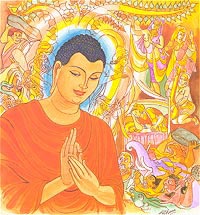
Verse 353. Buddha Is Teacherless
Beyond all beings, wise to all,
unsoiled by dhamma all am I,
left all and freed by craving’s end,
by self I’ve known, whom teacher call?
Explanation: I have overcome all, I know all, I am detached
from all, I have given up all; I am liberated from moral defilements
having eradicated craving. Having comprehended the four noble truths
by myself, whom shall I point out as my teacher.
SERVJAN VOICE
Dhammapada Verse 353
Upakajivaka VatthuSabbabhibhu sabbaviduhamasmi
sabbesu dhammesu anupalitto
sabbanjaho tanhakkhaye vimutto
sayam abhinnaya kamuddiseyyam.Verse 353: I have overcome all, I know all, I am detached from all, I have
given up all; I am liberated from moral defilements having eradicated craving,
(i.e., I have attained arahatship). Having comprehended the Four Noble Truths by
myself, whom should I point out as my teacher?
The Story of Upaka
The Buddha uttered Verse (353) of this book, in answer to the question put up
by Upaka, a non-Buddhist ascetic, while the Buddha was on his way to the Deer
Park (Migadaya) where the Group of Five Bhikkhus (Panca Vaggis) were staying.
The Buddha was going there to expound the Dhamma cakkappavattana Sutta to
the Panca Vaggis, his old associates, viz., Kondanna, Bhaddiya, Vappa, Assaji,
and Mahanama. When Upaka saw Gotama Buddha, he was very much impressed by the
radiant countenance of the Buddha and so said to him, “Friend, you look so
serene and pure; may I know who your teacher is?” To him, the Buddha
replied that he had no teacher.Then the Buddha spoke in verse as follows:
Verse 353: I have overcome all, I know all, I am
detached from all, I have given up all; I am liberated from moral
defilements having eradicated craving, (i.e., I have attained
arahatship). Having comprehended the Four Noble Truths by myself, whom
should I point out as my teacher?
At the end of the discourse Upaka expressed neither approval nor disapproval
but just nodded a few times and went on his way.
Seven riots in Akhilesh Yadav’s six months tenure as Uttar Pradesh CM, IB sets off riots alarm
Increasing incidents of communal violence in Uttar Pradesh
have raised the alarm at the top level, with the Intelligence Bureau
(IB) informing the Centre about the “volatile situation” in the state.
Friday
night’s violence in Ghaziabad’s Masuri area, in which six people were
killed, indicates that the state has become a communal tinderbox where
even a small spark can trigger a fullfledged riot.
This was the seventh riot in UP since Akhilesh Yadav
-led Samajwadi Party took over the reins of the state in March. In the
past few months communal violence took place in Mathura, Pratapgarh,
Bareilly, Meerut, Allahabad and Lucknow.
The IB has informed the
Centre that the volatile situation in UP is a cause for great alarm. It
said the pattern of most riots are similar - a localised dispute over
seemingly trivial matters blowing out of proportion.

A
preliminary probe into the Masuri violence suggests that someone
deliberately desecrated a religious text, wrote some objectionable words
on it and threw it in a locality dominated by a particular community.
“Whatever
happened was part of a conspiracy that was hatched many hours before
the violence started. The attackers were carrying deadly weapons which
indicate that they were professional criminals,” Ghaziabad SSP Prashant
Kumar said.
“We consider it an intelligence failure. Masuri
police station in-charge P. K. Singh has been suspended. We have also
recommended the suspension of three local intelligence unit (LIU)
officers,” he added.
A case has been registered against unidentified attackers and rumour mongers in connection with the incident.
The heat is now squarely on the SP government to restore harmony and law and order.
The home ministry’s latest figures reveal that the UP government has been ineffective in tackling communal violence.
Among
all the states, UP has reported the maximum number of communal
incidents - 364 - in the last three years which claimed 64 lives and
left 1,298 injured.
Even PM Manmohan Singh termed UP and four
other states - Madhya Pradesh, Maharashtra, Karnataka and Kerala - as
vulnerable to communal violence, while addressing the state DGPs’ meet
last week.

incidents have given the SP’s opponents a stick to beat the government
with. The BSP accused it of failing to protect Muslims, whose support
played a critical role in the SP’s return to power.
The BSP’s
charge does seem to have resonated among sections of the community as
the previous Mayawati government was perceived to have fared better in
the law and order situation.
This communal polarisation seems to
be benefiting the BJP, which did extremely well in the civic body
elections held in July. It won mayoral positions in major cities such as
Ghaziabad, Lucknow, Kanpur, Meerut, Agra, Gorakhpur, Moradabad,
Aligarh, Jhansi and Varanasi. The party also performed well in the last
phase of the assembly elections, which was in the Muslim-dominated
districts of western UP. The SP, however, denied that there was a
serious law and order problem in the state.
“As soon as the SP
came to power, our rivals started shouting that there is no law and
order in the state,” party spokesperson Rajendra Chaudhary said.
“Communalism
is a societal problem. It is not particular to the present
administration in UP. Anyone can testify that the SP has been in the
forefront of the battle against communalism,” he added.
19912 Wednesday LESSON 705 Vinaya Pitaka from FREE ONLINE eNālāndā Research and Practice UNIVERSITY through http://sarvajan.ambedkar.org
Vinaya Pitaka
The Vinaya pitaka, which is regarded as the sheet anchor of the Holy
Order, deals mainly with the rules and regulations of the Order of Bhikkhus (monks)
and Bhikkhunis (nuns). For nearly twenty years after the Awakenment
of the Buddha, no definite rules were laid down for control and discipline of
the Sangha (Order). Subsequently as occasion arose, the Buddha
promulgated rules for the future discipline of the Sangha. Reasons for the
promulgation of rules, their various implications, and specific Vinaya
ceremonies of the Sangha are fully described in the Vinaya pitaka. The history
of the gradual development of Sāsana [5]
from its very inception, a brief account of the life and ministry of the
Buddha, and details of the three Councils are some other additional relevant
contents of the Vinaya Pitaka. Indirectly it reveals useful information about
ancient history, Indian customs, ancient arts and sciences. One who reads the
Vinaya Pitaka cannot but be impressed by the democratic constitution of the
Sangha, their holding of possessions in common, the exceptionally high moral
standard of the Bhikkhus, and the unsurpassed administrative abilities of the
Buddha, who anticipated even the present Parliamentary system. Lord Zetland
writes; “And it may come as a surprise to many to learn that in the
Assemblies of the Buddhists in India two thousand years and more ago are to be
found the rudiments of our own Parliamentary practice of the present day. [6]“
The Vinaya Pitaka consists of the following five books:
1. Pārājika Pāli |
Vibhanga |
(Major Offences) |
2. Pācittiya Pāli |
(Minor Offences) |
|
3. Mahāvagga Pāli |
Khandaka |
(Greater Section) |
4. Cullavagga Pāli |
(Lesser Section) |
|
5. Parivāra Pāli |
(Epitome of the Vinaya) |
18912 Tuesday LESSON 704 -CO-OPERATIVE DIRECT INVESTMENT CODI CYBERNETIC
FAIR CYBERNETIC FAIR
SALE MART CF SALE MART from FREE ONLINE eNālāndā Research and Practice UNIVERSITY through http://sarvajan.ambedkar.org
CO-OPERATIVE DIRECT INVESTMENT
CODI
CYBERNETIC FAIR SALE MART
CF SALE MART
CO-OPERATIVE DIRECT INVESTMENT CODI CYBERNETIC FAIR SALE MART assert that, “The way to change
the world is to change the nature of man,”that offers Insight to Improve
Conditions for Planet, Inhabitants.
The world needs waves
of reforms.
Generate an opportunity to set the world on a more equitable and sustainable
path of development.
CYBERNETIC FAIR SALE MART much to offer that
process. CYBERNETIC FAIR SALE MART assert that, “The way to change the world
is to change the nature of man,” offers a critical insight into how to
improve conditions for our planet and its inhabitants.
The spirit to care not just for ourselves but for others, based on an awareness
of our interlinked fates, lies at the heart of CYBERNETIC FAIR SALE MART - and,
indeed, all of the world’s great religions.
These thoughts challenge families, communities and nations to act in concert
for the advancement of our common well-being. That is the best way to secure
individual and collective progress in an interdependent world.
We must also change longstanding assumptions and open our minds to new ideas
and possible solutions if we are to address major global threats, from the
proliferation of deadly weapons to intolerance and inequality.
We must invite Awaken Ones with Awareness and people of all traditions to use
the occasion to reflect on how we can change our actions to pave the way for a
more sustainable future.
Awakened One with Awareness bequeathed to humanity profound thoughts that can
guide our efforts to resolve the severe problems facing today’s world.
Injunction against the three poisons of greed, anger and ignorance is
especially relevant to multilateral efforts to overcome the hunger that
needlessly affects nearly a billion people in a world of plenty, the brutal
violence that takes millions of lives each year, and the senseless environmental
damage that humans cause to our only home, the planet Earth.
Socio-economic development may
sound modern, but its core is the very problem of human suffering that was
addressed more than 2,500 years ago.
Numerous Awakened One With Awareness organizations are putting these thoughts
into practice. Their support is for activities to achieve the Millennium
Development Goals, our blueprint for enabling all people to enjoy lives of
dignity and opportunity.
Let us draw on the universal values of Awakened Ones With Awareness to act in
solidarity with those who are suffering, thereby contributing to a more
compassionate and awakened world for all.
ECONOMY OF THE AWAKEN ONE WITH AWARENESS (CYBERNETIC FAIR SALE MART ) is to
provide all people with a minimum income.
Radiation theory sees the economy prospering through the virtuous actions of
individuals following the moral law.
CYBERNETIC FAIR SALE MART accept
existing political and economic institutions, even while providing a democratic
social ethos revolutionary for its time.
King Asoka, greatest of all Indian emperors, pursued a highly activist fiscal
policy even though he believed only meditation could help people to advance in
moral living.
CYBERNETIC FAIR SALE MART places great
stress on gift giving.
Income Redistribution in the Ideal State
Through the laws of cause and condition there is a distributive cycle of one’s
current social and economic position is due to one’s good cause and condition
accumulated in the past. This does not mean indifference to the poor, for one’s
economic status is not only dependent on the laws of cause and condition, but
is also complemented by the moral virtues of compassion and generosity.’ Alms
giving to the poor is regarded as increasing one’s merit. The importance of our
active intervention has some important implications for behavior of the
“righteous ruler” as well.
CYBERNETIC FAIR SALE MART kings are also
known for the financial aid which they provided for the poor; indeed, the kings
were advised to give their gifts to all who are poor. Moreover, gifts to the
those who practice CYBERNETIC FAIR SALE MART do not prevent them from providing a refuge
for the destitute or from redistributing such beneficence to the indigent.
Redistribution of income, either through the public or private, sectors, is
certainly regarded in a favorable light. In order to favor the spiritual improvement
of the population, the State is justified in taking steps to provide all people
with a minimum income.
Radiation: Virtue as a Positive Externality
CYBERNETIC FAIR SALE MART theory of
radiation sees the economy prospering through the collective impact of the
virtuous actions of individuals.
CYBERNETIC FAIR SALE MART argue that
since the economy can ultimately prosper only through virtuous action,
ultimately the only hope for prosperity lies in a regeneration of human kind,
e.g., through the cultivation of the Four Sublime Abodes (loving kindness,
compassion, sympathetic joy, and equanimity). Any appropriate good action
inevitably leads to an increase of the material wealth of the community.
Trade Through the Market
CYBERNETIC FAIR SALE MART discussion on
right livelihood prohibits trade in certain goods and services, which means
that all other types of trade are apparently allowed (but not explicitly
approved). In an interesting
comparison between trading and agriculture as means of livelihood, the CYBERNETIC
FAIR SALE MART also notes that both can
bring high or low returns, depending on the circumstances; however, trading is
an occupation with little to do, few duties, a small administration, and small
problems, while agriculture is the reverse. The capable merchant is approvingly
said to know the value of goods and prices and the profits he obtains; and to
buy where the price is low and to sell where the price is high.
A merchant who was generous to the cause was highly praised for his piety.
CYBERNETIC FAIR SALE MART accepts
competition in general in the sense that it is possible to compete without
hurting others,excel in virtue.
“prizes in the school of life that each may strive for to obtain…. If a
man chooses to interpret this as free competition, it is still competition
without rivalry, for victory to oneself does not mean the defeat of someone
else.”
Economic Policies
Description of the origins of property also discusses the origins of the State.
As crime increased after the division of the land, the people elected a king to
maintain law and order, paying him for his troubles. This suggests a type of
social contract theory, which means that the king has important obligations
toward the people.
Some of the discussion about economic policy are traditional Ten Royal Precepts
of Kingship: generosity, morality, liberality, uprightness, gentleness,
self-restraint, non-anger, non-hurtfulness, forbearance, and non-opposition.
However, more practical advice can also be found. For instance, one of the
sources, speaks of the Royal Acts to increase prosperity which include giving
of seed corn and food to farmers and of capital to merchants to start or
increase their business. The particular source emphasizes that if prosperity
increases, economic disorders and crime such as theft decrease.
Additional insight into State economic activities can be gained by examining
the records of some of the “righteous rulers” who are revered by the CYBERNETIC
FAIR SALE MART . It should be noted that because of the participation of the
State in the operations of the irrigation systems in many of these countries,
the crown had a fairly active role in the economy.
The prototypical important righteous ruler was the revered King Asoka (Ashoka)
(ca. 274-232 B.C.E.), the grandson of the founder of the Mauryan dynasty in
indict and one of the greatest of the Indian emperors.2 From Asoka’s edicts it
appears that he generally accepted the economic and political institutions of
his time.
However, he also took as the goal of statecraft the welfare and happiness of
the people. He adopted a highly activist fiscal policy, both with regard to
current and capital expenditures. For instance, he gave gifts to the aged,
other needy, and religious orders; he set up public education courses to teach
the doctrines of Rule of the Law; he cut back on large public festivals; he
imported and planted medicinal herbs; and he carried out various public works
projects such as digging of wells, planting of trees, construction of rest
houses and animal watering stations along main roads in the empire. Some of his
edicts appeared to enforce traditional CYBERNETIC FAIR SALE MART beliefs, e.g, bans on slaughtering various
animals. The funds spent on the maintenance of the crown and good works were
high, e.g., taxes were apparently about one fourth of the revenue of land.
Still another righteous ruler was King Ruang who lived in the 14th century
in Thailand, long after the canonical scriptures had been completed. Ruang
stated quite clearly that a righteous king brings prosperity to his subjects.
He apparently had a much less luxurious court or a less activist governmental
expenditure policy than Asoka, since he advised that taxes should be less than
10 percent of the crop (and less in a drought) and that such taxes should never
be higher than those of the preceding king. He also urged that the State
provide interest free loans to those wishing to engage in commerce and that no
profit taxes should be placed upon such commercial activities.
Awaken One with Awareness (CYBERNETIC FAIR SALE MART ) and Politics
The Awaken One with Awareness (CYBERNETIC FAIR SALE MART ) had gone beyond all
worldly affairs, but still gave advice on good government.
The CYBERNETIC FAIR SALE MART came from
a warrior caste and was naturally brought into association with kings, princes
and ministers. Despite His origin and association, He never resorted to the
influence of political power to introduce His thoughts nor allowed His Thoughts
to be misused for gaining political power. But today, many politicians try to
drag the CYBERNETIC FAIR SALE MART ’s name into politics by introducing Him as
a communist, capitalist, or even an imperialist. They have forgotten that the
new political philosophy as we know it really developed in the West long after
the CYBERNETIC FAIR SALE MART ’s time. Those who try to make use of the good
name of the CYBERNETIC FAIR SALE MART for their own personal advantage must remember
that the CYBERNETIC FAIR SALE MART was the Supremely Awaken One who had gone
beyond all worldly concerns.
There is an inherent problem of trying to intermingle religion with politics.
The basis of religion is morality, purity and faith, while that for politics is
power. In the course of history, religion has often been used to give
legitimacy to those in power and their exercise of that power. Religion was
used to justify wars and conquests, persecutions, atrocities, rebellions,
destruction of works of art and culture.
When religion is used to pander to political whims, it has to forego its high
moral ideals and become debased by worldly political demands.
The thrust of the CYBERNETIC FAIR SALE MART Rule of Law is not directed to the creation of
new political institutions and establishing political arrangements. Basically,
it seeks to approach the problems of society by reforming the individuals
constituting that society and by suggesting some general principles through
which the society can be guided towards greater humanism, improved welfare of
its members, and more equitable sharing of resources.
There is a limit to the extent to which a political system can safeguard the
happiness and prosperity of its people. No political system, no matter how
ideal it may appear to be, can bring about peace and happiness as long as the
people in the system are dominated by greed, hatred and delusion. In addition,
no matter what political system is adopted, there are certain universal factors
which the members of that society will have to experience: the effects of good
and bad Cause and Condition, the lack of real satisfaction or everlasting
happiness in the world characterized by unsatisfactoriness, impermanence), and
egolessness. To the CYBERNETIC FAIR SALE MART , nowhere in Samsara is
there real freedom, not even in the heavens or the world of Brahama.
Although a good and just political system which guarantees basic human rights
and contains checks and balances to the use of power is an important condition
for a happy in society, people should not fritter away their time by endlessly
searching for the ultimate political system where men can be completely free,
because complete freedom cannot be found in any system but only in minds which
are free. To be free, people will have to look within their own minds and work
towards freeing themselves from the chains of ignorance and craving. Freedom in
the truest sense is only possible when a person uses Rule of Law to develop his
character through good speech and action and to train his mind so as to expand
his mental potential and achieve his ultimate aim of awaken-ness.
While recognizing the usefulness of separating religion from politics and the
limitations of political systems in bringing about peace and happiness, there
are several aspects of the CYBERNETIC FAIR SALE MART ’s thoughts which
have close correspondence to the political arrangements of the present day.
Firstly, the CYBERNETIC FAIR SALE MART spoke about the equality of all human beings
long before Abraham Lincoln, and that classes and castes are artificial
barriers erected by society. The only classification of human beings, according
to the CYBERNETIC FAIR SALE MART , is based on the quality of their moral
conduct. Secondly, the CYBERNETIC FAIR SALE MART encouraged the spirit of social -co-operation
and active participation in society. This spirit is actively promoted in the
political process of modern societies. Thirdly, since no one was appointed as
the CYBERNETIC FAIR SALE MART ’s successor, the members of the Order were
to be guided by the Rule of Law. Until today very member of the Order is to
abide by the Rule of Law which governs and guides their conduct.
Fourthly, the CYBERNETIC FAIR SALE MART encouraged the spirit of consultation and the
democratic process. This is shown within the community of the Order in which
all members have the right to decide on matters of general concern. When a
serious question arose demanding attention, the issues were put before the
monks and discussed in a manner similar to the democratic parliamentary system
used today. This self-governing procedure may come as a surprise to many to
learn that in the assemblies of CYBERNETIC FAIR SALE MART s in India
2,500 years and more ago are to be found the rudiments of the parliamentary
practice of the present day. A special officer similar to ‘Mr. Speaker’ was
appointed to preserve the dignity of the Parliamentary Chief Whip, was also
appointed to see if the quorum was secured. Matters were put forward in the
form of a motion which was open to discussion. In some cases it was done once,
in others three times, thus anticipating the practice of Parliament in
requiring that a bill be read a third time before it becomes law. If the
discussion showed a difference of opinion, it was to be settled by the vote of
the majority through balloting.
The CYBERNETIC FAIR SALE MART approach to political power is the
moralization and the responsible use of public power. The CYBERNETIC FAIR
SALE MART preached non-violence and
peace as a universal message. He did not approve of violence or the destruction
of life, and declared that there is no such thing as a ‘just’ war. He taught:
‘The victor breeds hatred, the defeated lives in misery. He who renounces both
victory and defeat is happy and peaceful.’ Not only did the Buddha teach
non-violence and peace, He was perhaps the first and only religious teacher who
went to the battlefield personally to prevent the outbreak of a war. He
diffused tension between the Sakyas and the Koliyas who were about to wage war
over the waters of Rohini. He also dissuaded King Ajatasattu from attacking the
Kingdom of the Vajjis.
The CYBERNETIC FAIR SALE MART discussed the importance and the
prerequisites of a good government. He showed how the country could become
corrupt, degenerate and unhappy when the head of the government becomes corrupt
and unjust. He spoke against corruption and how a government should act based
on humanitarian principles.
The CYBERNETIC FAIR SALE MART once
said, ‘When the ruler of a country is just and good, the ministers become just
and good; when the ministers are just and good, the higher officials become
just and good; when the higher officials are just and good, the rank and file
become just and good; when the rank and file become just and good, the people
become just and good.
The CYBERNETIC FAIR SALE MART said
that immorality and crime, such as theft, falsehood, violence, hatred, cruelty,
could arise from poverty. Kings and governments may try to suppress crime
through punishment, but it is futile to eradicate crimes through force.
The CYBERNETIC FAIR SALE MART suggested economic development instead of
force to reduce crime. The government should use the country’s resources to
improve the economic conditions of the country. It could embark on agricultural
and rural development, provide financial support to entrepreneurs and business,
provide adequate wages for workers to maintain a decent life with human
dignity.
The CYBERNETIC FAIR SALE MART had
gtiven to rules for Good Government. These ten rules can be applied even
today by any government which wishes to rule the country peacefully. The rules
are as follows:
1) be liberal and avoid selfishness,
2) maintain a high
moral character,
3) be prepared to sacrifice one’s
own pleasure for the well-being of the subjects,
4) be honest and maintain absolute
integrity,
5) be kind and gentle,
6) lead a simple life for the subjects to emulate,
7) be free from hatred of any kind,
8) exercise
non-violence,
9) practice patience,
and
10) respect public opinion to
promote peace and harmony.
Regarding the behavior of rulers, He further advised:
- A good ruler should act impartially and should not be biased and discriminate
between one particular group of subjects against another.
- A good ruler should not harbor any form of hatred against any of his
subjects.
- A good ruler should show no fear whatsoever in the enforcement of the law, if
it is justifiable.
- A good ruler must possess a clear understanding of the law to be enforced. It
should not be enforced just because the ruler has the authority to enforce the
law. It must be done in a reasonable manner and with common sense.
‘If a man, who is unfit, incompetent, immoral, improper, unable and unworthy of
kingship, has enthroned himself a king or a ruler with great authority, he is
subject to be tortured‚ to be subject to a variety of punishment by the people,
because, being unfit and unworthy, he has placed himself unrighteously in the
seat of sovereignty. The ruler, like others who violate and transgress moral
codes and basic rules of all social laws of mankind, is equally subject to
punishment; and moreover, to be censured is the ruler who conducts himself as a
robber of the public. It is mentioned that a ruler who punishes innocent people
and does not punish the culprit is not suitable to rule a country.
The king always improves himself and carefully examines his own conduct in
deeds, words and thoughts, trying to discover and listen to public opinion as
to whether or not he had been guilty of any faults and mistakes in ruling the
kingdom. If it is found that he rules unrighteously, the public will complain
that they are ruined by the wicked ruler with unjust treatment, punishment,
taxation, or other oppressions including corruption of any kind, and they will
react against him in one way or another. On the contrary, if he rules
righteously they will bless him: ‘Long live His Majesty.’ (Majjhima Nikaya)
The CYBERNETIC FAIR SALE MART ’s emphasis on the moral duty of a ruler to use
public power to improve the welfare of the people had inspired Emperor Asoka in
the Third Century B.C. to do likewise. Emperor Asoka, a sparkling example of
this principle, resolved to live according to and preach the Rule of Law and to
serve his subjects and all humanity. He declared his non-aggressive intentions
to his neighbors, assuring them of his goodwill and sending envoys to distant
kings bearing his message of peace and non-aggression. He promoted the
energetic practice of the socio-moral virtues of honesty, truthfulness, compassion,
benevolence, non-violence, considerate behavior towards all, non-extravagance,
non-acquisitiveness, and non-injury to animals. He encouraged religious freedom
and mutual respect for each other’s creed. He went on periodic tours preaching
the Rule of Law to the rural people. He undertook works of public utility, such
as founding of hospitals for men and animals, supplying of medicine, planting
of roadside trees and groves, digging of wells, and construction of watering
sheds and rest houses. He expressly forbade cruelty to animals.
Sometimes the CYBERNETIC FAIR SALE MART is said to be a social reformer. Among other
things, He condemned the caste system, recognized the equality of people, spoke
on the need to improve socio-economic conditions, recognized the importance of
a more equitable distribution of wealth among the rich and the poor, raised the
status of women, recommended the incorporation of humanism in government and
administration, and taught that a society should not be run by greed but with
consideration and compassion for the people. Despite all these, His
contribution to mankind is much greater because He took off at a point which no
other social reformer before or ever since had done, that is, by going to the
deepest roots of human ill which are found in the human mind. It is only in the
human mind that true reform can be effected. Reforms imposed by force upon the
external world have a very short life because they have no roots. But those
reforms which spring as a result of the transformation of man’s inner consciousness
remain rooted. While their branches spread outwards, they draw their
nourishment from an unfailing source — the subconscious imperatives of the
life-stream itself. So reforms come about when men’s minds have prepared the
way for them, and they live as long as men revitalize them out of their own
love of truth, justice and their fellow men.
The doctrine preached by the CYBERNETIC FAIR SALE MART is not one based on ‘Political Philosophy’.
Nor is it a doctrine that encourages men to worldly pleasures. It sets out a
way to attain Eternal Bliss. In other words, its ultimate aim is to put an end
to craving that keeps them in bondage to this world.’The path that leads
to worldly gain is one, and the path that leads to Eternal Bliss (by leading a
religious life)is another.’
However, this does not mean that CYBERNETIC FAIR SALE MART s cannot or
should not get involved in the political process, which is a social reality.
The lives of the members of a society are shaped by laws and regulations,
economic arrangements allowed within a country, institutional arrangements,
which are influenced by the political arrangements of that society.
Nevertheless, if a CYBERNETIC FAIR SALE MART wishes to be involved in
politics, he should not misuse religion to gain political powers, nor is it
advisable for those who have renounced the worldly life to lead a pure,
religious life to be actively involved in politics.
Putting Awaken One with Awareness (CYBERNETIC FAIR SALE MART ) to Work:
A New Approach to Management and Business
Awaken One with Awareness (CYBERNETIC FAIR SALE MART ) Economics: The Emerging
Middle Path between Capitalism and Socialism.
A novel approach to economic management that goes beyond socialism and
capitalism. The proposed economics for the 21st century is ‘Awaken One with
Awareness (CYBERNETIC FAIR SALE MART ) Economics’.
Based on the insight of the Awaken One with Awareness (CYBERNETIC FAIR SALE
MART ) that spiritual liberation is attained by avoiding extremes, whether by
indulgence in worldly pleasures or severe asceticism, and treading namely ‘ the
Middle Way ‘, ‘Awaken One with Awareness (CYBERNETIC FAIR SALE MART )
Economics ‘ is recommended as the ideal middle path between the competing
models of capitalism and socialism. Both these systems, have failed to contain
the relentless destruction of the natural environment and the human community,
thereby forcing leading executives and planners to search for new solutions for
planetary problems.
Best aspects of both capitalist and socialist economic systems is drawn
in ‘ Awaken One with Awareness (CYBERNETIC FAIR SALE MART ) Economics ‘
model. It supports the conventional forces of a free market and competition
without destroying either nature or human society. Alternate vision of
sustainable economics is meant to be more just and more ecologically sound.
Inspired by the fundamental CYBERNETIC FAIR SALE MART insight of the inter-connectedness existing
among all living things, that CYBERNETIC FAIR SALE MART , Economics and Ecology
are all inter-related. There is a heavy emphasis on the concept of freedom as
understood in CYBERNETIC FAIR SALE MART in contrast to the Western concept of
‘freedom’. In the West ‘freedom’ revolves around the rights of the individual
i.e. freedom to do what one wishes. In CYBERNETIC FAIR SALE MART , ‘freedom’
means freedom from personal desires or attachments.
An CYBERNETIC FAIR SALE MART approach to
economics requires an understanding that economics and a moral and spiritual
life are neither separate nor mutually exclusive. The 20th Century has been
ravaged by a materialistic, self-centered consumerism. The next century needs
to focus on the quality and spirituality of life itself. CYBERNETIC FAIR SALE
MART , which advocates the ‘Middle Path’, serves as an important resource to
pursue an alternative to the extremes of capitalism and socialism, or pure
self-interest and utter self-negation.
The Essence of Awaken One with Awareness (CYBERNETIC FAIR SALE MART ) Economics
Three key phrases are identified that underlie the model of Awaken One with
Awareness (CYBERNETIC FAIR SALE MART ) Economics.
They are:
1) an economics that benefits oneself and others
2) an economics of tolerance and peace
3) an economics that can save the earth.
An Economics that benefits oneself and others
Theory of free enterprise based on the concept of self-benefit is developed.
This led to people being more concerned with enriching themselves and
disregarding the interests of others. At the international level, major
colonial powers such as England, Netherlands, France, Portugal and Spain
developed their economies from the resources taken from other poorer regions,
without an adequate resulting benefit accruing to the colonies. In contrast,
the earlier CYBERNETIC FAIR SALE MART societies such as India during the time of the
CYBERNETIC FAIR SALE MART or Japan
during the time of Prince Shotuku ( 574 - 622 AD ) existed with a radically
different social approach. In Japanese society where the density of population
was high, human relations were tightly interwoven, and Japanese people were
encouraged to pay great attention to how other people thought or reacted. In
the Japanese world of business, earning the trust of others and entering into
mutually beneficial transactions have always been given priority. Such conduct
was the result of deep-seated CYBERNETIC FAIR SALE MART influence.
The Western obsession with ’self-benefit ‘ and indifference to the rights of
non-European people has been well analysed by former Indian diplomat
K.M.Panikkar in his ground breaking book ‘Asia and Western Domination - A
Survey of the Vasco De Gama Epoch of Asian History 1498 - 1945, published in
1953. Panikkar says that western colonial powers were reluctant to recognise
that doctrines of international law applied outside Europe or that European
nations had any moral obligations when dealing with Asian people. For example,
when Britain insisted on the opium trade against the laws of China in the 19th
Century, there was a prohibition by law on opium smoking in England. In
countries under direct British occupation eg. India, Ceylon and Burma, though
there were equal rights established by law, there was considerable reservation
in enforcing the law against Europeans. Maurice Collis, a British magistrate in
Burma, gives a rare candid account in his book ‘Trials in Burma’ ( 1938 ) about
the pressures brought upon him by the members of the Colonial Government and
the British expatriate community, to be partial towards Europeans in his
judgments. Panikkar avers that this doctrine of different rights (which made a
mockery of the concept of the Rule of Law) persisted to the very end of western
colonial domination and was a prime cause of Europe’s ultimate failure in Asia.
An Economics of Tolerance and Peace
The Indian Emperor Asoka established the world’s first welfare state in the
third century BC upon embracing CYBERNETIC FAIR SALE MART approach. He renounced the idea of conquest by
the sword. In contrast to the western concept of ‘ Rule of Law ‘, Asoka
embarked upon a ‘policy of piety or rule of righteousness’. The basic
assumption of this policy of piety was that the ruler who serves as a moral
model would be more effective than one who rules purely by strict law
enforcement. The right method of governing is not only by legislation and law
enforcement, but also by promoting the moral education of the people. Asoka
began by issuing edicts concerning the ideas and practice of Rule of Law,
dealing with universal law and social order. Realizing that poverty eroded the
social fabric, one of his first acts was to fund social welfare and other
public projects. Asoka’s ideals involved promoting policies for the benefit of
everyone in society, treating all his subjects as if they were his children and
protecting religion. He built hospitals, animal welfare shelters and enforced a
ban on owning slaves and killing. He gave recognition to animal rights in a
number of his rock edicts and accepted state responsibility for the protection
of animals. Animal sacrifice was forbidden by law.
An important aspect of Asoka’s economics of peace was tolerance. In one of his
rock edicts, Asoka calls for religious freedom and tolerance, and declares that
by respecting someone else’s religion, one brings credit to one’s own religion.
The idea of religious tolerance only emerged in the West in 1689 with the
publication of John Locke’s book ‘ A Letter Concerning Toleration ‘.
From a CYBERNETIC FAIR SALE MART perspective, politics can be summed up by the
wheel turner, which means a king or political ruler who protects his people and
the CYBERNETIC FAIR SALE MART t teachings. Asoka was the prototype of this
ruler whose political ideas were to inspire a countless number of other Asian
Emperors and rulers. One enthusiastic follower of Asoka in Japan was Prince
Shotuku. (574 - 622 AD ). An ardent believer in CYBERNETIC FAIR SALE MART approach, Shotukti drafted a 17 Article
Constitution (the first CYBERNETIC FAIR SALE MART approach Constitution of Japan), which was
promulgated in 604 AD. Shotuku appeals neither to ’self-evident truths ‘ (as in
the American Constitution ) nor to some divine right of kings as the basis of
law. Instead he begins pragmatically by stating that if society is to work
efficiently for the good of all, then people must restrain factionalism and
learn to work together. A key feature of this Constitution is the emphasis
placed on resolving differences by appeals to harmony and common good, using
the procedure of consensus. This approach is in marked contrast to the western
view that factions can be controlled only legally by a balance of powers.
Decision making by consensus is a significant characteristic of Japanese
society. Every effort is made to ensure that minority dissident factions are
not allowed to lose face.
The influence of CYBERNETIC FAIR SALE MART approach in Japan was such that in 792 AD
Emperor Kammu (781 - 806 AD) despite constant threats from Korea, abolished the
100 year old national army, except for one regiment to guard the region near
Korea. National security was maintained by sons of local clan leaders somewhat
similar to the present day police. Japan was effectively without an army until
the emergence of the new warrior class before the Kamakura, Shogunate (1192 -
1333 AD). Tibet is another example of demilitarisation (in the 17th century).
What is significant to note here is that long before the ideal of demilitarisation
was espoused in western countries, ancient Buddhist countries had already
implemented it. In Japan, beginning from the 9th century, the death penalty was
abolished for nearly three and a
half centuries.
An Economics to save the Earth
The practice of industrial societies indulging in a policy of take-and-take
from nature is criticized, despite economics being fundamentally about exchange
or give-and-take.A possible root cause of the western attitude towards nature.
This passage declares:
“So God created man in his own image, in the image created he him, male
and female created he them. And God blessed them, and God said unto them,
“Be fruitful and multiply, and replenish the earth and subdue it, and have
dominion over the fish of the sea, and over the fowl of the air, and over every
living thing that moveth upon the earth”.
Some have interpreted this passage literally, as one giving divine sanction to
domination of the earth for the benefit of only human beings and disregarding
the interests of both plants and other living creatures of this world. In
contrast, CYBERNETIC FAIR SALE MART approach sacred texts are much more humble and
always emphasise the need to live in harmony with nature and peacefully
co-exist with other living creatures, as the ideal and noble way. In the CYBERNETIC
FAIR SALE MART approach worldview,
humans rather being masters of this earth, simply make up one tiny element in a
vast cosmos. In the CYBERNETIC FAIR SALE MART approach Economics that proposes, the earth
rather than human beings will be placed at the center of our worldview.
History of Economics
The major ideas in the theories of prominent economists such as Adam Smith
(1723 - 1790), David Ricardo (1772 - 1823), Karl, Marx (1818 - 1883), John
Keynes (1883 - 1946) Joan Robinson (1903 - 1983) and the German Economists
Friedrich von Hayek (1899 - 1992), Wilhelm Lopke (1899 - 1966) and Ludwig
Erhard (1897 - 1977) is examined.Lopke’s best-selling book ‘ Civitas Humanas
(Human Citizen) published in 1949 as laying the foundation for the new
humanistic school of economics is singled out.The concept of `social market
economics’ advocated by Ludwig Erhard in his 1957 book ‘Woffistand fur Alles
(Happiness for All ) as the precedent for developing the new CYBERNETIC FAIR
SALE MART approach Economics is used.
Erhard called for the need to overcome the inherent tensions between the haves
and have-nots in society, through such governmental policies as the banning of
cartels, using government ‘price valuation’ to ensure fair pricing, rent
control and supporting people with disabilities.
Dr. E.F Schumacher’s book ‘Small is Beautiful’, which has a chapter on CYBERNETIC
FAIR SALE MART approach Economics is an
inspiration. Schumacher was heavily influenced by CYBERNETIC FAIR SALE MART approach meditation and wisdom during his time
in Myanmar (formerly Burma). Though Schumacher recommended a new approach to
economics based on CYBERNETIC FAIR SALE MART approach, that Schumacher’s ultimate solutions
were sought in Christian oriented ethics. Nevertheless, that Schumacher’s book
should serve as a wake up call for those living in CYBERNETIC FAIR SALE MART approacht countries. He further says that
given the destruction of the natural environment that has taken place in the
industrial West, the time has come to use a
CYBERNETIC FAIR SALE MART approach to
economics.
Historical Background of Awaken One with Awareness (CYBERNETIC FAIR SALE MART )
Economics
The life story of the CYBERNETIC FAIR SALE MART offers a valuable lesson when focusing on CYBERNETIC
FAIR SALE MART approach economics. The
Prince rejected the material comforts of a royal life, and also realised the
futility of asceticism and denial of natural physical needs. ‘’The CYBERNETIC
FAIR SALE MART walked a fine line
between materialism and denial of the world, and this middle way or moderate
standpoint is fundamental to understanding CYBERNETIC FAIR SALE MART Economics’.
The ordinary public and the merchant class supported CYBERNETIC FAIR SALE MART approach from the very outset. As CYBERNETIC
FAIR SALE MART approach moved eastwards
over the centuries, to China, Korea and Japan it absorbed elements of the
culture of these countries and became transformed along the way. It also
managed to transform the societies and economies of these countries by
introducing ethical concepts into the pursuit of profit. In Japanese history
there has been substantial CYBERNETIC FAIR SALE MART approach support of commerce, which had come
to fruition during the Edo period (1603 - 1867). This period witnessed an
explosion of economic activity. Some sociologists have found interesting
parallels in the connections between the Protestant work ethic and capitalism,
and between the rise of Japanese Capitalism and the religious thought of the
time.
Unrestrained Consumption
The world’s natural resources would be depleted if two factors are not
immediately addressed:
1) the ever increasing population growth, and
2) the mismanagement of desire ( particularly of
those people in the so-called advanced countries)
In the Ryoan-ji, the CYBERNETIC FAIR SALE MART Temple of Kyoto, famous for its stone and sand
garden, there is a poem carved on a stone, which says ‘ Know what one really
needs ‘. This is no simple injunction. To know what one really needs in life
requires great wisdom. But to have the strength to say ‘no’ to the unessential
products in life would release a person from the coils of consumption. This
view i.e. of wanting what is really essential reflects the CYBERNETIC FAIR SALE
MART approach view of consumption and it
is the ideal attitude to be promoted in the coming century.
Right Livelihood
Right livelihood is one of the components of the Noble Eightfold Path. Its
importance lies in the fact that the work one does for a living influences a
person’s thinking. The CYBERNETIC FAIR SALE MART has named five types of occupations as
unwholesome ways of earning a living. They are 1) Selling liquor or being
connected with the production and sale of liquor 2) Sale of flesh or being
connected with the raising and killing of animals 3) Poison (includes drugs) 4)
Trading in living beings (includes slavery or for similar purposes) 5)
Dangerous weapons.
The layman’s code of discipline or gihi vinaya is the premise for
developing the right work ethic for the next century. In one passage CYBERNETIC
FAIR SALE MART says “One should
work like a bee to earn one’s livelihood. Do not wait for others to help, nor
depend on others foolishly”.CYBERNETIC FAIR SALE MART showed his concern for the material welfare
and the spiritual development of his lay disciples. In the discourse to young
Sigala, the CYBERNETIC FAIR SALE MART explained the full range of duties owed by a
layman to all those with whom he interacts. The CYBERNETIC FAIR SALE MART also indicated how wealth has to be spent i.e.
one portion for one’s needs, which includes offerings to Order of CYBERNETIC
FAIR SALE MART and charity, two portions
on investment and the fourth portion to be kept for an emergency.
Japanese entrepreneurs who had incorporated CYBERNETIC FAIR SALE MART principles and meditation techniques in their
day to day work in an effort to develop a more humanistic and environmentalist
business ethic.
Awaken One with Awareness (CYBERNETIC FAIR SALE MART ) Economic Vision
Provides food for thought to anyone wishing to adopt an innovative approach to
Management and Business. However the greatest appeal of this highly readable
book lies in the elaborate development of Schumacher’s profound insight that
there is another way of approaching economics, based on the ideas taught in the
East 2500 years ago, particularly of the fundamental interconnectedness of
people and nature. It is upon this premise that the world can shift from a
throw-away culture to a more sustainable* civilisation. This work also throws a
challenge to governments in CYBERNETIC FAIR SALE MART approach countries to develop a CYBERNETIC
FAIR SALE MART economic vision as a part
of national planning, as we move towards a new millennium.
17912 Monday LESSON 703 - from FREE ONLINE eNālāndā Research and Practice UNIVERSITY through http://sarvajan.ambedkar.org
Dhammapada Verses 351 and 352 Mara Vatthu-Verse 351. The Person Who Has Reached The Goal-Verse 352. The Man Of Great Wisdom
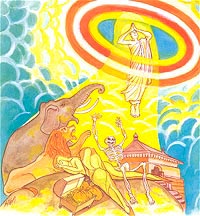 |
Verse 351. The Person Who Has Reached The Goal
Explanation: He has come to cessation. He has reached the |
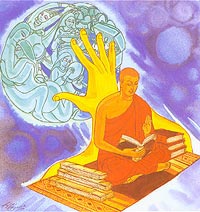 |
Verse 352. The Man Of Great Wisdom
Explanation: He is free of craving and devoid of grasping. |
Dhammapada Verses 351 and 352
Mara VatthuNitthangato asantasi
vitatanho anangano
acchindi bhavasallani
antimoyam samussayo.Vitatanho anadano
niruttipadakovido1
akkharanam sannipatam
janna pubbaparani ca
sa ve “antimasariro
mahpanno mahapuriso” ti vuccati.Verse 351: He who has attained arahatship is free from fear, free from
craving, and free from moral defilements. He has cut off the thorns of existence
(such as lust). This is the last existence2 (for him).Verse 352: He who is free from craving and from attachment, who is skilled in
the knowledge of the significance of terms, who knows the grouping of letters
and their sequence is indeed called “one who has lived his last, a man of
great wisdom, a great man.”
1. niruttipadakovido: skilled in niruttipatisambhida i.e., skilled in the
knowledge of words.2. lit., body.
The Story of Mara
While residing at the Jetavana monastery, the Buddha uttered Verses (351) and
(352) of this book, with reference to Mara who had come to frighten Samanera
Rahula, son of Gotama Buddha.On one occasion, a large number of bhikkhus arrived at the Jetavana
monastery. To put up the guest bhikkhus, Samanera Rahula had to go and sleep
near the door, just outside the chamber of the Buddha. Mara, wanting to annoy
the Buddha through his son, took the form of an elephant and encircling the head
of the samanera with his trunk made an alarming noise hoping to frighten him.
But Rahula was unmoved. The Buddha, from his chamber, knew what was happening,
and said, “O wicked Mara! Even a thousand such as you would not be able
to frighten my son. My son has no fear, he is free from craving, he is vigilant,
he is wise.”Then the Buddha spoke in verse as follows:
Verse 351: He who has attained arahatship is free
from fear, free from craving, and free from moral defilements. He has
cut off the thorns of existence (such as lust). This is the last
existence (for him).Verse 352: He who is free from craving and from
attachment, who is skilled in the knowledge of the significance of
terms, who knows the grouping of letters and their sequence is indeed
called “one who has lived his last, a man of great wisdom, a
great man.”
Hearing the above words, Mara realized that the Buddha knew about his tricks
and instantly disappeared.
16912 Sunday LESSON 702 - from FREE ONLINE eNālāndā Research and Practice UNIVERSITY through http://sarvajan.ambedkar.org
Dhammapada Verses 349 and 350 Culadhanuggaha Pandita Vatthu-Verse 349. Craving Tightens Bonds-Verse 350. He Cuts Off Bonds Of Mara
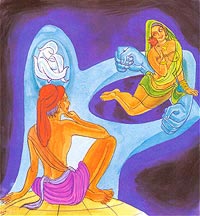 |
Verse 349. Craving Tightens Bonds
Explanation: In those whose minds are agitated and assailed |
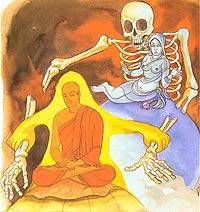 |
Verse 350. He Cuts Off Bonds Of Mara
Explanation: He who is constantly engaged in dispelling the
|
VOICE OF AWAKEN ONE WITH AWARENESS (AOA)
AIM
TO ACHIEVE
FINAL GOAL OF ETERNAL BLISS FOR SELF AND ALL
WITH THE RULE OF LAW OF ECONOMY OF AOA TRADE
THROUGH CONVERGENCE OF
CYBERNETICS
INFORMATION
BIO
NANO
INTEGRATED PRODUCT DEFINITION
AND TRADITIONAL METHOD
TECHNOLOGIES
15912 Saturday LESSON 701 - from FREE ONLINE eNālāndā Research and Practice UNIVERSITY through http://sarvajan.ambedkar.org
Dhammapada Verse 348 Uggasena Vatthu-Reaching The Further Shore
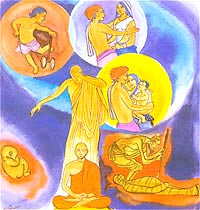
Verse 348. Reaching The Further Shore
Let go before, let go the after,
let go the middle, beyond the becoming.
With mind released in every way
you’ll come no more to birth, decay.
Explanation: Give up the past, give up the future, give up
the present. Having reached the end of existence, with a mind free
(of all conditioned things), you will not again undergo birth and
decay.
Dhammapada Verse 348
Uggasena VatthuMuncapure1munca pacchato2
majjhe3munca bhavassa paragu4
sabbattha vimuttamanaso
na punam jatijaram upehisi.Verse 348: Give up the past, give up the future, give up the present. Having
reached the end of existences, with a mind freed from all (conditioned things),
you will not again undergo birth and decay.
1, 2, 3. pure, pacchato, majjhe: the reference is
to attachment to the past, future and present Khandha aggregates.4. bhavassa paragu: one who has gane to the other shore or end of
existences (i.e., Nibbana); an arahat.
The Story of Uggasena
While residing at the Jetavana monastery, the Buddha uttered Verse (348) of
this book, with reference to Uggasena, a rich man’s son who fell in love with a
dancer.Once, a wandering theatrical troupe consisting of five hundred dancers and
some acrobats came to Rajagaha and performed on the grounds of the palace of
King Bimbisara for seven days. There, a young dancer who was the daughter of an
acrobat sang and danced on top of a long bamboo pole. Uggasena, the young son of
a rich man, fell desperately in love with this dancer and his parents could not
stop him from marrying her. He married the young dancer and followed the troupe.
As he was not a dancer nor an acrobat, he was not of much use to the party. So,
as the party moved from place to place, he had to help carry boxes, to drive the
carts, etc.In course of time, a son was born to Uggasena and his wife, the dancer. To
this child, the dancer would often sing a song which ran thus: “O you, son
of the man who keeps watch over the carts; the man who carries boxes and
bundles! O , you, son of the ignorant one who can do nothing!” Uggasena
heard the song; he knew that his wife was referring to him and he was very much
hurt and depressed. So he went to his father-in-law, the acrobat, and requested
him to teach him acrobatics. After a year’s training, Uggasena became a skilful
acrobat.Then, Uggasena went back to Rajagaha, and it was proclaimed that Uggasena
would publicly demonstrate his skill in seven days’ time. On the seventh day, a
long pole was put up and Uggasena stood on top of it. At a signal given from
below he somersaulted seven times on the pole. At about this time, the Buddha
saw Uggasena in his vision and knew that time was ripe for Uggasena to attain
arahatship. So, he entered Rajagaha and willed that the audience should turn
their attention to him instead of applauding Uggasena for his acrobatic feats.
When Uggasena saw that he was being neglected and ignored, he just sat on top of
the pole, feeling very discontented and depressed. The Buddha then addressed
Uggasena, “Uggasena, a wise man should abandon all attachment to the
khandha aggregates and strive to gain liberation from the round of
rebirths.”Then the Buddha spoke in verse as follows:
Verse 348: Give up the past, give up the future, give
up the present. Having reached the end of existences, with a mind
freed from all (conditioned things), you will not again undergo birth
and decay.
At the end of the discourse Uggasena, who was still on top of the pole,
attained arahatship. He came down and was soon admitted to the Order by the
Buddha.
14912 Friday LESSON 700 - from FREE ONLINE eNālāndā Research and Practice UNIVERSITY through http://sarvajan.ambedkar.org
Dhammapada Verse 347 Khematheri Vatthu-Verse 347. Spider Web Of Passion
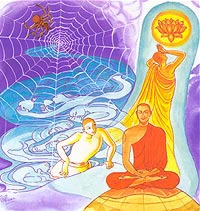
Verse 347. Spider Web Of Passion
Ensnared in passion back they fall
as spider on a self-spun web.
This passion severed, wander the wise
forsaking dukkha all.
Explanation: Beings who are infatuated with lust fall back
into the stream of craving they have generated, just as a spider does
in the web it has spun. The wise cutting off the bound of craving,
walk on resolutely, leaving all ills (dukkha) behind.
Dhammapada Verse 347
Khematheri VatthuYe ragaratt’nupatanti sotam
sayamkatam makkatakova jalam
etampi chetvana vajanti dhira
anapekkhino sabbadukkham pahaya.Verse 347: Beings who are infatuated with lust, fall back into the Stream of
Craving they have generated, just as a spider does in the web it has spun. The
Wise, cutting off the bond of craving, walk on resolutely, leaving, all ills (dukkha)
behind.
The Story of Theri Khema
While residing at the Veluvana monastery, the Buddha uttered Verse (347) of
this book, with reference to Queen Khema.Queen Khema was the chief queen of King Bimbisara. She was very beautiful and
also very proud.The king wanted her to go to the Veluvana monastery and pay homage to the
Buddha. But she had heard that the Buddha always talked disparagingly about
beauty and she therefore tried to avoid seeing the Buddha.The king understood her attitude towards the Buddha; he also know how proud
she was of her beauty. So the king ordered his minstrels to sing in praise of
the Veluvana monastery, about its pleasant and peaceful atmosphere, etc. Hearing
them, Queen Khema became interested and decided to set out for the Veluvana
monastery.When Queen Khema arrived at the monastery, the Buddha was expounding the
Dhamma to an audience. By his supernormal power, the Buddha made a very
beautiful young lady appear, sitting not far from him, and fanning him. When
Queen Khema came to the audience hall, she alone saw the beautiful young lady.
Comparing the exquisite beauty of the young lady to that of her own, Khema
realised that her beauty was much inferior to that of the young lady. As she
looked again intently at the young lady her beauty began to fade gradually. In
the end, she saw before her eyes an old decrepit being, which again changed into
a corpse, her stinking body being attacked by maggots. At that instant, Queen
Khema realized the impermanence and worthlessness of beauty.The Buddha knowing the state of her mind remarked, “O Khema! Look
carefully at this decaying body which is built around a skeleton of bones and is
subject to disease and decay. Look carefully at the body which is thought of so
highly by the foolish. Look at the worthlessness of the beauty of this young
girl.” After hearing this, Queen Khema attained Sotapatti Fruition.Then the Buddha spoke in verse as follows:
Verse 347: Beings who are infatuated with lust, fall
back into the Stream of Craving they have generated, just as a spider
does in the web it has spun. The Wise, cutting off the bond of
craving, walk on resolutely, leaving, all ills (dukkha) behind.
At the end of the discourse Queen Khema attained arahatship and was admitted
to the Order and became the Chief Female Disciple of the Buddha.
13912 Thursday LESSON 699 - மூன்று கூடைகள் திபிதக![]() TIPITAKA from FREE ONLINE eNālāndā Research and Practice UNIVERSITY through http://sarvajan.ambedkar.org
TIPITAKA from FREE ONLINE eNālāndā Research and Practice UNIVERSITY through http://sarvajan.ambedkar.org
Sutta Piṭaka
மதிய திரள் மஜ்ஜிம நிகாய Majjhima Nikāya
முழு சரம்
(புத்தசமய புனித நூ லின் ஒரு
பாகம்) ஸப்பாஸவ ஸுத்தா Sabbāsava Sutta
(MN 2)
http://www.youtube.com/watch?v=iSwDrWENbQI
for
In HD - San Diego 2012 MN 2 All the Taints -
Sabbāsava Sutta
Dhammapada Verses 345 and 346 Bandhanagara Vatthu -Verse 345. Bonds Of Attachment-Verse 346. Bonds Are Strong, But The Wise Get Rid Of Them
>> Tipiṭaka >> Sutta Piṭaka >> Majjhima Nikāya
முழு சரம்
(புத்தசமய புனித நூ லின் ஒரு
பாகம்) ஸப்பாஸவ ஸுத்தா
மிக சுவாரசியமான
சரம், மன தை
நுரைகொள்விக்கிற வேறுமாதிரியான வழிவகை ஆசூச(புனிதத்த்னமையைக் கெடுத்தல்) நிவாரணம்.
Sabbāsava Sutta
(MN 2) - enhanced ATI
Very interesting sutta, where
the different ways by which the āsavas, fermentating defilements of the mind,
are dispelled.
Pāḷiபாளி ஏவங் மே ஸுத்தங்: ஏகங் ஸமயங். பகவா ஸாவத்யங் விஹாரதி ஜேதவனே அனாதபிண்டிகஸ்ஸ ஆராமே. தத்ர பகவா Evaṃ me sutaṃ: ekaṃ samayaṃ bhagavā -பிக்காவோ‘தி. |
Englishதமிழ் நான் கேட்டுக்கொண்டிருந்தேன்: ஓர் சமயம் பகவான் EnglishI have heard that on one occasion the Blessed
-பிக்குகளே. English |
|
– ‘bhikkhavo’ti. - ‘பந்தே‘தி தே பிக்கு பகவதோ பச்சஸ்ஸோஸுங். பகவா எததவொச: – ‘Bhadante’ti te bhikkhū bhagavato paccassosuṃ. Bhagavā etadavoca: -‘ஸப்பாஸவஸங்வரப்பரியாயங் |
– Monks!
- அப்படியே ஆகுக ‘பந்தே’ என பிக்குகள் English– Yes, lord, the monks
-‘முழு English
|
|
– ‘Sabbāsavasaṃvarapariyāyaṃ vo, bhikkhave, desessāmi. Taṃ suṇātha, |
– Monks, I will teach you the
|
|
-‘ ஏவங், – ‘Evaṃ, bhante’ti kho te bhikkhū - ஜாந்தோ |
-‘ அப்படியே ஆகுக ‘பந்தே’ என பிக்குகள் English– As you say, sir, the monks
-நான் போதிப்பேன், பிக்குகளே, நொதித்தல்களின் English |
|
– Jānato ahaṃ, bhikkhave, passato அத்தி, பிக்காவே, ஆஸவா தஸ்ஸனா |
– Monks,
அவ்விடத்தில், பிக்குகளே, பார்பதால் கைவிடப்படவேண்டிய English |
|
Atthi, bhikkhave, āsavā dassanā |
There are fermentations to be |
please watch:
http://www.rtbot.net/Majjhima
http://wisdomthroughmindfulness.blogspot.in/2011_08_01_archive.html
http://zomobo.net/middle-length-discourses




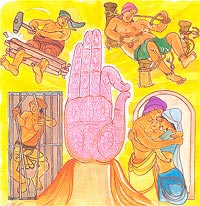 |
Verse 345. Bonds Of Attachment
Explanation: The yearning for sons and wives are a stronger |
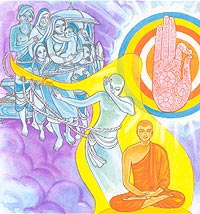 |
Verse 346. Bonds Are Strong, But The Wise Get Rid Of Them
Explanation: The wise agree that this is a strong bond. It |
Dhammapada Verses 345 and 346
Bandhanagara Vatthu
Na tam dalham bandhanamahu dhira
yadayasam darujapabbajanca
sarattaratta manikundalesu
puttesu daresu ca ya apekkha.
Etam dalham bandhanamahu dhira
oharinam sithilam duppamuncam
etampi chetvana paribbajanti
anapekkhino kamasukham pahaya.
Verses 345 & 346: The wise do not say that bonds made of iron, of wood,
and of hemp are strong bonds; they say that only passionate attachment to and
care for gems and jewelry, children and wives are strong bonds. These drag one
down (to lower planes of existence) and although they seem yielding are
difficult to unfasten. The wise, cutting off this bond (of craving) and
resolutely giving up sensual pleasures, renounce the world.
The Story on Imprisonment
While residing at the Jetavana monastery, the Buddha uttered Verses (345) and
(346) of this book, with reference to some thieves who were kept in chains.
One day, thirty bhikkhus came into Savatthi for alms-food. While they were on
their alms-round, they saw some prisoners being brought out with their hands and
legs in chains. Back at the monastery, after relating what they had seen in the
morning, they asked the Buddha whether there were any other bonds stronger than
these. To them the Buddha answered, “Bhikkhus! These bonds are nothing
compared to those of craving for food and clothing, for riches and for family.
Craving is a thousand times, a hundred thousand times stronger than those
chains, hand-cuffs and cages. That is the reason why the wise cut off craving
and renounce the world and enter the Order of the bhikkhus.”
Then the Buddha spoke in verse as follows:
| Verses 345 & 346: The wise do not say that bonds made of iron, of wood, and of hemp are strong bonds; they say that only passionate attachment to and care for gems and jewelry, children and wives are strong bonds. These drag one down (to lower planes of existence) and although they seem yielding are difficult to unfasten. The wise, cutting off this bond (of craving) and resolutely giving up sensual pleasures, renounce the world. |
12912 Wednesday LESSON 698 - மூன்று கூடைகள் திபிதக![]() TIPITAKA from FREE ONLINE eNālāndā Research and Practice UNIVERSITY through http://sarvajan.ambedkar.org
TIPITAKA from FREE ONLINE eNālāndā Research and Practice UNIVERSITY through http://sarvajan.ambedkar.org  Sutta Piṭaka
Sutta Piṭaka
மதிய திரள் மஜ்ஜிம நிகாய Majjhima Nikāya

மதிய
திரள் மஜ்ஜிம நிகாய
Majjhima Nikāya
— The discourses of
medium length —
[ majjhima: medium ]
புத்தரால்
கொடுக்கப்பட்ட
152 மத்திம
( நடுத்தரமான
நீட்சி
) பல்வேறு
வகைப்பட்ட
விஷயங்கள்
செயல்
தொடர்புடன்
போதனையுரைகள்
கொய்சகமாக்கப்பட்டது.
The
Majjhima Nikāya gathers 152 discourses of the Buddha of intermediate length,
dealing with diverse matters.
முழு
சரம் (புத்தசமய புனித நூ லின்
ஒரு பாகம்) ஸப்பாஸவ ஸுத்தா
மிக சுவாரசியமான
சரம், மன தை
நுரைகொள்விக்கிற வேறுமாதிரியான வழிவகை ஆசூச(புனிதத்த்னமையைக் கெடுத்தல்) நிவாரணம்.
Sabbāsava Sutta
(MN 2) - enhanced ATI
Very interesting sutta, where
the different ways by which the āsavas, fermentating defilements of the mind,
are dispelled.
பய
சரம் (புத்தசமய புனித நூ லின்
ஒரு பாகம்) பயபேரவ
ஸுத்தா இச்சரத்தில்,
இதரபதார்த்தங்களுடன், புத்தர் மூன்று விஞ்ஞான ஞான ங்களை, அவர் இராத்திரி பொழுதில் அவருடைய முயற்சியினால் அடை ஞானோதயங்களை விவரிக்கிறார்.
Bhayabherava
Sutta (MN 4) {excerpt} - enhanced ATI
http://www.youtube.com/watch?v=sYPRh4tzB98
In this sutta, among other
things, the Buddha expounds the three vijjās he attained during the night of
his awakenment.
உடுப்பு
(போர்வைகள்) சரம் வத்திர ஸுத்தா இச்சரத்தில், இதரபதார்த்தங்களுடன், புத்தர் பதினாறு
உபக்கிலேஸஸ் ஒழுக்கச் சீர்க்கேடுகளை
வரையறை செய்கிறார்.
Vattha Sutta (MN
7) {excerpt} - enhanced ATIIn this sutta, the Buddha,
among other things, defines sixteen upakkilesas.
மாபெரும்
அரச மரபு
சரம் (புத்தசமய புனித நூ லின்
ஒரு பாகம்)
ஒரு புகழ்பெற்ற
இலங்கையைச் சார்ந்த
வரலாற்று புகழ், பாளியில், ஐந்தாவது நூற்றாண்டில், மஹாநாமா என்ற பெயருடைய
பிக்குவால் எழுதி வைக்கப்பட்டிருக்கிறது.
- பன்னிப்பன்னிச் சொன்னது.
ஸாரிபுத்த,
ஆயஸம மஹாகொத்திக கேட்ட பற்பலவிதமான சுவாரசியமான வினாக்களுக்கு விடைகூ றி மற்றும்
இந்த நுலிலிருந்து எடுத்த பகுதியில்,
அவர், வேதனா(உறுதலுணர்ச்சி, புலன்றிவு, புரிவு, வலி,
துன்பம் ,
ஸன்யா, (புலனுணர்வு ,
விழிப்புணர்வுநிலை , மனத்தின் அறிவுத்திறம் , எண்ணம் , குறி , குறிப்புணர்த்தும் உடலுறுப்பசை வியக்கம் , விஞ்ஞானவை
(அறிவாற்றல், அறிவு ,
உள்ளம் ) தெளிவாக விளக்கி விரித்துரைக்வில்லை ஆனால் ஆழ்ந்து செறிக்கப்பட்டிருக்கிறது.
Mahāvedalla Sutta
(MN 43) {excerpt} - word by word
Sāriputta answers various
interesting questions asked by āyasmā Mahākoṭṭhika, and in this excerpt, he explains that
Vedanā, Saññā and Viññāṇa are not clearly delineated but deeply
interwoven.
ஒற்றை
உடல் உச்சி
சவரத் தலை மேலான
குடுமி உரோமம்,
ஒரு மண்டவரி மேடு,
தழைமுடி சரம் (புத்தசமய புனித நூ லின்
ஒரு பாகம்)- எளிய முதுப்பாடம்
பிக்குனி
தம்மாதின்னா, விஸாகா கேட்ட ஒரு தொடர் சுவாரசியமான வினாக்களுக்கு விடைகூ றி, அவர், இதரபதார்த்தங்களுடன்,
20-மடக்கு
சொற்பொருள் விளக்கம்
கொடுகிறார்.
Cūḷavedalla Sutta (MN 44)
{excerpt} - plain texts
The bhikkhuni Dhammadinnā
answers a series of interesting questions asked by Visākha. Among other things,
she gives the 20-fold definition of sakkāyadiṭṭhi.
ஸெக்கா
நாயுருவி செடி சரம் (புத்தசமய புனித நூ லின் ஒரு பாகம்)- செழுமைப்படுத்திய ATI
புத்தர் ஆனந்தாவை ஸெக்கா
நாயுருவி செடி பத்திப்பதா உட்புகுதல் அர்த்தசாரம் சொல்ல வினவுகிறார், அவர் ஒரு திடீரடியான அறிய ஆர்வ
முள்ளதை தேடி ஒரு மாற்று
தொடரை மேற்பாடமாகக்கொண்டு ஏழு நல்லதான தன்மைகளை பதிப்புரு ஞாபகசக்தி தடங்க ல்களை கைவிடுதலுக்கு
மற்று உதாரணங்கள் முதலியவைகளால் தெளிவாக்கப்பட்ட
உவமைகளுடன் சொல்கிறார்.
Sekha Sutta (MN
53) - enhanced ATI
The Buddha asks Ānanda to
expound the Sekha Paṭipadā, of which he gives a surprising version,
from which Satisampajañña and Nīvaraṇānaṃ Pahāna are curiously replaced by a series of
seven ‘good qualities’, and which is illustrated by a telling simile.
புவேதானிய
சரம் (புத்தசமய புனித நூ லின்
ஒரு பாகம்)- பன்னிப்பன்னிச் சொன்னது.
இந்த
நூலிலிருந்து ஒரு சுருக்க
பகுதியை, புத்தர் ஐந்து தரம் அல்லது ஆக்கக் கூறு புலனுணர்வுக்கு ஆட்பட்ட
இன்பநுகர்வு மற்றும் ஓர் முக்கியமான இன்னொரு வகை இன்பநுகர்வுடன் ஒப்பீடு செய்து வரையறுக்கிறார்.
Bahuvedanīya
Sutta (MN 59) {excerpt} - word by word
In this short excerpt, the
Buddha defines the five kāmaguṇās and makes an important comparison with
another type of pleasure.
சுவாசம்
உள்ளுயிர்ப்பு மற்றும் மூச்சுவிடல் (மூச்சு உட்சுவாசி மற்றும் வெளியிடு) சரம் (புத்தசமய
புனித நூ லின்
ஒரு பாகம்)- பன்னிப்பன்னிச் சொன்னது.
புகழ்பெற்ற
சுவாசம் உள்ளுயிர்ப்பு மற்றும் மூச்சுவிடல் பயிற்சி செய்தல்
மற்றும் எப்படி நான்கு கவனிப்பை ஸ்தாபித்து (முனைப்பார்வமுள்ள தியானம்) பயிற்சி செய்ய
முன்னோடியாக மற்றும் பின்னர் ஏழு போதியின்
உறுப்பினர் அல்லது ஆக்கக் கூ ற்றை
எய்த புத்தரின் உச்ச உயர்வான
ஞான னோதயங்களை எய்த வேண்டி நிவர்த்திசெய்தல்.
Ānāpānassati
Sutta (MN 118) - word by word
The famous sutta about the
practice of ānāpānassati, and how it leads to the practice of the four satipaṭṭhānas and subsquently to the fulfillment of the
seven bojjhaṅgas.
ஆறு
புலனுணர்வு ஞானேந்திரிய சரம் (புத்தசமய புனித நூ லின் ஒரு பாகம்)- எளிய முதுப்பாடம்.
இந்த
ஆழமான மற்றும் மிக சுவாரசியமான சரம், புத்தர் இதரபதார்த்தங்களுடன் எது மகிழ்வளிக்கிற
புலனாய்வு, மகிழ்ச்சியற்ற மற்றும் நடுநிலை மனஞ் சார்ந்த உள்ளுணர்ச்சிகள், மற்றும் கூடுதலாக புத்தரை
பற்றிய தரமான வர்ணனை சொற்றொடரில் கண்டுபிடிக்கப்பட்டதை வரையறுக்கிறார்.
Saḷāyatanavibhaṅga Sutta (MN 137) {excerpt}
- plain texts
In this deep and very interesting sutta, the
Buddha defines among other things what are the investigations of pleasant,
unpleasant and neutral mental feelings, and also defines the expression found
in the standard description of the Buddha: ‘anuttaro purisadammasārathī’.
——————oooOooo——————
11912 Tuesday LESSON 697 - மூன்று கூடைகள் திபிதக![]() TIPITAKA from FREE ONLINE eNālāndā Research and Practice UNIVERSITY through http://sarvajan.ambedkar.org
TIPITAKA from FREE ONLINE eNālāndā Research and Practice UNIVERSITY through http://sarvajan.ambedkar.org
Dhammapada Verse 344Vibbhantabhikkhu Vatthu-Freed From Craving Runs Back To Craving
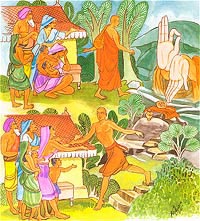
Verse 344. Freed From Craving Runs Back To Craving
Who without woodness inclines to the wood.
Free in the wood to woodness returns.
Do now regard that person well
who free returns to fetter.
Explanation: Having left the forest of desire he takes to
the forest of the practice (i.e. the life of a monk); but when he
is free from the forest of desire he rushes back to that very forest.
Come, look at that man who having become free rushes back into that
very bondage.
Dhammapada Verse 344
Vibbhantabhikkhu VatthuYo nibbanatho vanadhimutto
vanamutto vanameva dhavati
tam puggalametha passatha
mutto bandhanameva dhavati.Verse 344: Having left the forest of desire (i.e., the life of a
householder), he takes to the forest of the practice (i.e., the life of a
bhikkhu); but when he is free from the forest of desire he rushes back to that
very forest. Come, look at that man who having become free rushes back into that
very bondage.
The Story of an Ex-Bhikkhu
While residing at the Veluvana monastery, the Buddha uttered Verse (344) of
this book, with reference to a bhikkhu who was a pupil of the Venerable
Mahakassapa.As a pupil of the Venerable Mahakassapa, this bhikkhu had achieved the four
mental absorptions (jhanas). But one day, as he went for alms-food to his
uncle’s house, he saw a woman and felt a great desire to have her. Then he left
the Order of the bhikkhus. As a layman, he was a failure as he did not work
hard. So, his uncle drove him out of the house, and subsequently he became mixed
up with some thieves. All of them were caught by the authorities and were taken
to the cemetery to be executed. The Venerable Mahakassapa saw his pupil as he
was being led out and said to him, “My pupil, keep your mind steadfastly on
a subject of meditation.” As instructed, he concentrated and let himself be
established in deep mental absorption. At the cemetery, while the executioners
were making preparations to kill him, the ex-bhikkhu was very much composed and
showed no signs of fear or anxiety. The executioners and the onlookers were
awe-struck and very much impressed by the man’s courage and composure and they
reported about him to the king and also to the Buddha. The king gave orders to
release the man. The Buddha on hearing about the matter sent his radiance and
appeared to the thief as if in person.Then the Buddha spoke to him in verse as follows:
Verse 344: Having left the forest of desire (i.e., the
life of a householder), he takes to the forest of the practice (i.e.,
the life of a bhikkhu); but when he is free from the forest of desire
he rushes back to that very forest. Come, look at that man who having
become free rushes back into that very bondage.
At the end of the discourse, the thief who was steadfastly keeping his mind
on the arising and perishing of the aggregates discerned the impermanent,
unsatisfactory and non-self nature of all conditioned things and soon attained
Sotapatti Fruition. Later, he went to the Buddha at the Jetavana monastery where
he was again admitted to the Order by the Buddha and he instantly attained
arahatship.
9 and 10912 Sunday and Monday LESSON 696 - மூன்று கூடைகள் திபிதக![]() TIPITAKA from FREE ONLINE eNālāndā Research and Practice UNIVERSITY through http://sarvajan.ambedkar.org
TIPITAKA from FREE ONLINE eNālāndā Research and Practice UNIVERSITY through http://sarvajan.ambedkar.org
Dhammapada Verses 338 to 343 Sukarapotika Vatthu-Verse 338. Craving Uneradicated Brings Suffering Over and Over-Verse 339. Caught In The Currents Of Craving-Verse 340. The Creeper of Craving-Verse 341. Bliss Does Not Come Through Craving-Verse 342. The Bonds That Entrap MenVerse 343. Nibbana By Shunning Craving
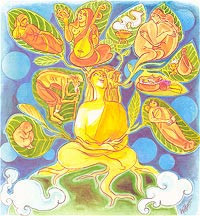 |
Verse 338. Craving Uneradicated Brings Suffering Over and Over
Explanation: Even when a tree has been cut down, it will grow |
 |
Verse 339. Caught In The Currents Of Craving
Explanation: If in a person the thirty-six streams flow strongly |
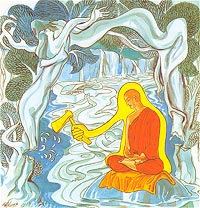 |
Verse 340. The Creeper of Craving
Explanation: The streams of craving flow towards objects everywhere. |
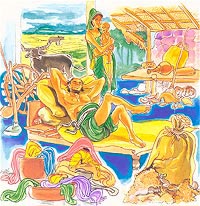 |
Verse 341. Bliss Does Not Come Through Craving
Explanation: Craving arises in people like flowing streams. |
 |
Verse 342. The Bonds That Entrap Men
Explanation: Surrounded by craving the masses tremble like |
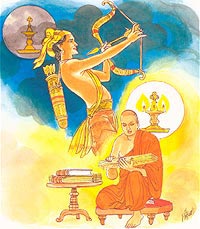 |
Verse 343. Nibbana By Shunning Craving
Explanation: Surrounded by craving the masses tremble like |
Dhammapada Verses 338 to 343
Sukarapotika Vatthu
Yathapi mule anupaddave dalhe
chinnopi rukkho punareva ruhati
evampi tanhanusaye anuhate
nibbattati dukkhamidam punappunam.
Yassa chattimsati sota
manapasavana bhusa
maha vahanti dudditthim
sankappa raganissita.
Savanti sabbadhi sota
lati uppajja titthati
tanca disva latam jatam
mulam pannaya chindatha.
Saritani sinehatani ca
somanassani bhavanti jantuno
te satasita sukhesino
te ve jatijarupaga nara.
Tasinaya purakkhata paja
parisappanti sasova bandhito
samyojanasangasattaka
dukkhamupenti punappunam ciraya.
Tasinaya purakkhata paja
parisappanti sasova bandhito
tasma tasinam vinodaye
akankhanta viragamattano.
Verse 338: Just as a tree with roots undamaged and firm grows again even
though cut down, so also, if latent craving is not rooted out, this dukkha (of
birth, ageing and death) arises again and again.
Verse 339: That man of wrong views, in whom the thirty-six streams (of
craving) that flow towards pleasurable objects are strong, is carried away by
his many thoughts connected with passion.
Verse 340: The stream of craving flows towards all sense objects; the creeper
of craving arises (at the six sense-doors) and fixes itself (on the six sense
objects). Seeing that creeper of craving growing, cut off its roots with Magga
Insight.
Verse 341: In beings, there flows happiness that is smeared with craving;
those beings attached to pleasure and seeking pleasure are, indeed, subject to
birth and ageing.
Verse 342: People beset with craving are terrified like a hare caught in a
snare; held fast by fetters and bonds they undergo dukkha (round of rebirths)
again and again, for a long time.
Verse 343: People beset with craving are terrified like a hare caught in a
snare. Therefore, One who wishes to free himself from craving should eradicate
craving.
The Story of a Young Sow
While residing at the Veluvana monastery, the Buddha uttered Verses (338) to
(343) of this book, with reference to a young sow.
On one occasion, while the Buddha was on an alms-round at Rajagaha, he saw a
young dirty sow and smiled. When asked by the Venerable Ananda, the Buddha
replied, “Ananda, this young sow was a hen during the time of Kakusandha
Buddha. As she was then staying near a refectory in a monastery she used to hear
the recitation of the sacred text and the discourses on the Dhamma. When she
died she was reborn as a princess. On one occasion, while going to the latrine,
the princess noticed the maggots and she became mindful of the loathsomeness of
the body, etc. When she died she was reborn in the Brahma realm as a puthujjana
brahma but later due to some evil kamma, she was reborn as a sow. Ananda! Look,
on account of good and evil kamma there is no end of the round of
existences.”
Then the Buddha spoke in verse as follows:
|
Verse 338: Just as a tree with roots undamaged and |
|
Verse 339: That man of wrong views, in whom the |
|
Verse 340: The stream of craving flows towards all |
|
Verse 341: In beings, there flows happiness that |
|
Verse 342: People beset with craving are terrified |
|
Verse 343: People beset with craving are terrified |
VOICE OF SARVAJAN
ADW goof-up stalls Scheduled Caste scholar’s UK programme
A Scheduled Caste (SC) student who has made it to a premier educational
institution in the United Kingdom has been denied scholarship after
being awarded one by the Adi Dravidar Welfare (ADW) Department. This has
come as a dampener at a time when SC/STs are slowly moving forward and
have started to enter the upper echelons of higher education.
K.
Saravanan is a scholar selected by the School of Chemistry, University
of Manchester, for Ph.D. research with a fellowship awarded by the
department under a scholarship scheme for SC students for studying in
universities abroad.
He was selected for the
scholarship in 2009 (November 19, 2009), according to the documents
obtained through the Right to Information Act. The scheme supports SC
students for four years.
After his interview in 2009,
he was declared successful and given confirmation letter to proceed for
higher studies. However, until now, the ADW Department has not released
any funds. The aspiring candidate was shocked to know that his
scholarship was cancelled due to insufficient funds, after he had joined
the course.
Mr. Saravanan was chosen for the
fellowship by the competent authority and his proposal went through an
elaborate process. The University of Manchester admitted him to the
Ph.D. Programme in Drug Discovery only after a rigorous test and
discussion.
On November 19, 2009, the ADW Department
held the interview for scholarship and Mr. Saravanan was one among the
two candidates selected for the SC student foreign scholarship.
According
to the endorsement letter issued by ADW Commissioner P. Sivasankaran,
Mr. Saravanan was provisionally selected for the overseas fellowship
scheme. Mr. Sivasankaran had sent a letter to the Head, School of
Chemistry, University of Manchester, that the government of Tamil Nadu
would cover tuition fees, maintenance allowance, and contingency
allowance of Mr. Saravanan.
Meanwhile, Mr. Saravanan was asked to join the university after producing the award letter.
The
ADW Department, in a letter, had advised him to proceed with his visa
formalities and asked him to join the course, making financial
arrangements on his own, as it might take some time to get the
administrative approval. As he was not in a position to mobilise the
required funds, he had waited for the release of funds.
During
2011, on the request of ADW Department, again Mr. Saravanan submitted
the admission letter and the approval was sought for the release of
funds. On the belief that he would be awarded the scholarship, Saravanan
got his visa to UK and proceeded on his journey by borrowing money from
relatives, friends and teachers.
The ADW
Commissioner again wrote to Prof. Whitehead requesting that Mr.
Saravanan could be allowed to join the University of Manchester to
pursue Ph.D.
However, the Secretary wrote to the ADW
Commissioner that the time period to get the fellowship had been closed
for the said financial year (2011-12) and also no sufficient funds were
available. But, in an earlier case, the first awardee got the funds
released after he joined the course in a university in UK, says Mr.
Saravanan.
The information collected through RTI Act
states that ADW Minister, N. Subramanian, had rejected his application
on the ground that the candidate had not joined the said programme in
September 2011. But Mr. Saravanan contends that the Department had sent
the relevant files only in September 2011 to the Principal Secretary
(Finance) and Chief Secretary, who signed the files in December 2011.
Appeal to Chief Minister
The
RTI documents reveal that ADW Department had goofed up the whole issue
as it had misquoted the tuition fee as 7,000 pounds, though Mr.
Saravanan had clearly mentioned it as 17,000 pounds. The ADW Department
cited it as a typographic error. As a last resort, he has written to the
Chief Minister’s special cell seeking justice. He is awaiting a
favourable order from Chief Minister Jayalalithaa.
Says complainant: Trivedi’s cartoons insult Constitution
Twenty-seven-year-old Amit Arvind Katarnaware, who filed the complaint against cartoonist Aseem Trivedi, told
The Hindu
that he was offended by the insult to the Constitution and to the Ashoka
pillar. The pillar is the symbol of Emperor Ashoka, who is revered by
Buddhists. A Central Railway employee, he said he did not belong to any
political party and was an independent activist who fought for human
rights.
His complaint also names Anna Hazare, Arvind Kejriwal and others from the IAC, but the main culprit is [Mr.] Trivedi, he stated.
A
third-year student of Legal Sciences and Law at a Navi Mumbai college,
Mr. Katarnaware said everyone had a right to protest, but freedom of
speech cannot violate the law of the land.
Mr. Trivedi could not be
found and it was only 20 days ago that his location was tracked through
his mobile phone.
One of the
cartoons depicts the “Gang Rape of Mother India” where a politician, a
bureaucrat and a devil symbolising corruption are seen standing around
‘Mother India,’ as the politician is saying “come on hurry up.”
Another
cartoon titled ‘New National Symbols’ shows the Ashoka Pillar with
three wolves, their jaws dripping blood with the caption “Wolfs with the
sign of Danger.”
Another cartoon depicts 26/11 terrorist
Ajmal Kasab as a dog, urinating on the Constitution of India and in
another Parliament is depicted as a giant toilet bowl. Mr. Trivedi has
critiqued the national bird too, showing it as a vulture, while the
national animal is dubbed “netasaur”.
Mr. Trivedi has
been charged with sedition, a non-bailable and cognisable offence under
Section 124 of the Indian Penal Code, for which he can imprisoned for
life and fined, or with imprisonment that may extend up to three years.
He can also be punished for upto three years and fined under section 2 of the prevention of insult to National Honour Act 1971 which punishes , “whoever in any public place or any other place w ithin public views burns, mutilates, defaces, defiles, disfigures, destroys, tramples upon or otherwise shows disrespect to or brings into contempt (whether by words, either spoken or written, or by acts) the Indian National Flag or the Constitution of India or any part thereof.”









